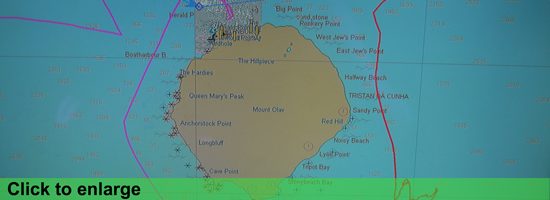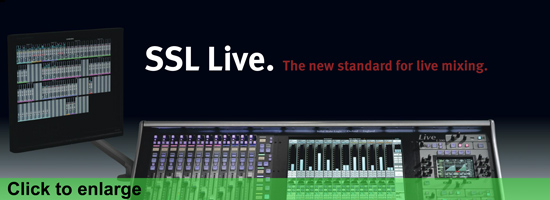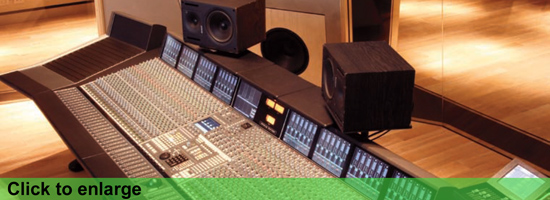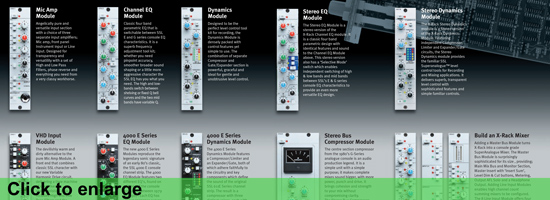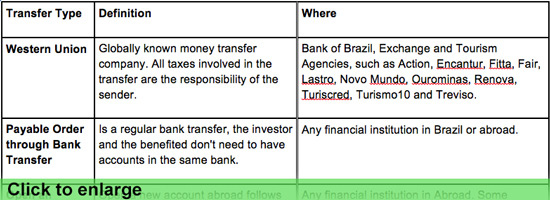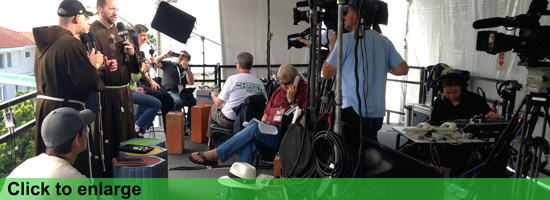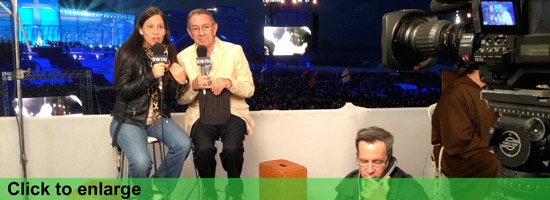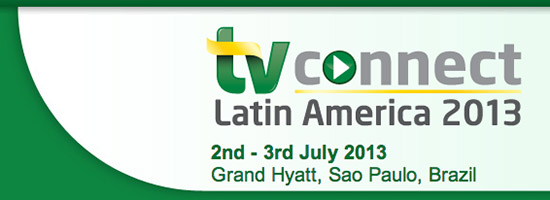
Brazilian TAX authorities clarify positions on the export of services and temporary imports of goods
Brazilian TAX authorities clarify positions on the export of services and temporary imports of goods

We found a very interesting article from june 2016 on the website of International Tax Review. It is an important article for Broadcast and Audio Visual companies who want to do a productions and so do business in Brazil. The temporary import law has being changed last year, the change was connected to the upcoming event ‘Olympic Games’ in Rio de Janeiro. To make the temporary import of Audio Visual equipment a little bit less of pain for the customs at airports and ports. The temporary import law is still in-tact and foreign audiovisual companies need to know about it for getting your ENG camera set or even a whole OBvan into Brasil without paying important taxes. But as the article will show… it is more than just that. Read the article here.
We have made past years also some other articles about this and other financial subjects concerning doing business and working in Brazil:
• Authorization for Filming in Brazil
• Remittance of International Payments
• Startup a company in Brazil
To have assistance in getting your crew and equipment into Brazil we can just point you out to a experiances ‘fixer’ in Brazil who help out with the temporary import and help at the airport customs. Connecting Media is very familiar with Brazil, it’s law’s and culture, check their page here.
We hope you’ll like it.
Like us if you want on Facebook, follow us on Twitter and Subscribe to our YouTube channel.
IPTV in Brazil
IPTV in Brazil
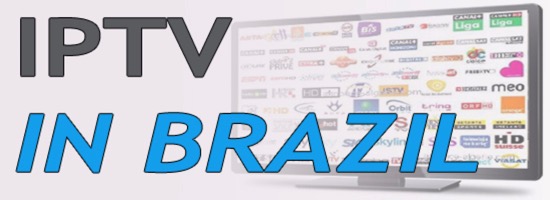
The demand for better quality, greater variety of content, option to consume interactive services are the main points for the growing of the technology and fall in the taste of users. The Television over IP is an alternative technology to DTH that instead of using satellite systems uses a part of the internet bandwidth. This requires a set-top box to change the IP signal to your television. To be able to use the service you need at least an exclusive connection of 4 Mbps for HD content with MPEG-4 compression. However, each channel determines the transmission rate, such as Globo TV that requires HD programming delivering to the client at 18 Mbps.

In addition to the interactive system, you can do purchases, access movie sites, videos, music and photo presentations without the necessity of a computer. In the security system can highlight two transmission systems, CAS (Conditional Access System) where there is control of transmission of a service to the consumer; and DRM (Digital Rights Management) that allows or not the use of digital imaging products, video or audio.
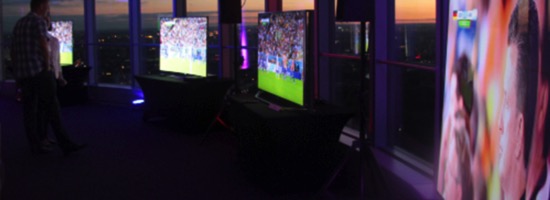
In Brazil, the pioneer was Brasil Telecom with Videon in Brasilia (DF), allowing the viewer to acquire films, documentaries, cartoons, concerts, shows and exclusive content that go beyond the concept of broadcasting, as a combination of telephony services directly on television. Today there are some initiatives at Telefônica, Oi, CTBC and Sumicity in Rio de Janeiro.
Another trend is the Unicast mode, since the possibility IPTV content and flexibility, such as on-demand services. The programming grid (EPG) customization is a one-way, in case of interactivity, and there is a lot of opportunities, exploration and a lot of research to do in this field. It is worth mentioning that connectivity with mobile devices is essential to the success of IPTV and the possibility of content in 4K and 8K with compatible TVs.
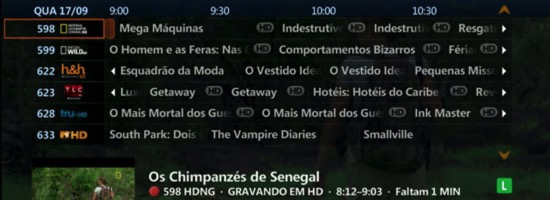
The success of the service will depend on some regulatory obstacles and other technologies such as FTTH, with the aid of optical fiber on delivery of a service with great quality. The QuadPlay with IPTV can replace the use DTH, excluding satellite system dependence, which in adverse conditions the signal may be interrupted, such as during storms or co-exist in a hybrid way. In 2015, the increase in service was 43.24% compared to the previous year, DTH had 60.07% of the market in July 2015, against 61.01% in December 2014 (according to data from Convergecom).

Among the problems faced in Brazil to implement the mass service, there is the limitation of Internet quality (great use of radio, instead of optical fiber) and outdated infrastructure that do not support enough amounts of data. It is therefore essential investment in fiber and high-capacity backbones for the proper functioning. By the end of this year, it is likely that Brazilian market grows along the upgrades of IPTV.
More news on the subject and future trends, you can see here in Broadcast Brazil.
video:
We would like to thank Marcel Almeida for writing for us.
More info you can find on his LinkedIn: br.linkedin.com/in/marcelmg77/en or follow him on Twitter @marcelmg77
Like us if you want on Facebook, follow us on Twitter and Subscribe to our YouTube channel.
mentioned:
Brasil Telecom : Website - Facebook - Twitter - YouTube
Telefônica : Website - Facebook - Twitter - YouTube
Oi : Website - Facebook - Twitter - YouTube
CTBC : Website - Facebook
Sumicity : Website - Facebook - Twitter - YouTube
A Dutch EVS operator at Rio Carnival
A Dutch EVS operator at Carnival in Rio de Janeiro
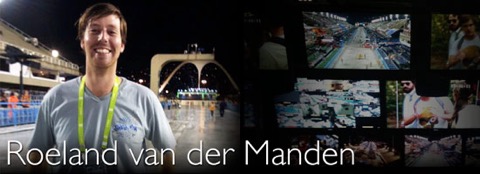
We all know Brazilian Carnival right?
We talked with Roeland van der Manden, one of the EVS Operators of last Carnival in Rio de Janeiro
BB: So Roeland, please tell us what is your function, and what does it include
Roeland: “EVS-operator. EVS is a system that makes live editing possible and makes replays at live events. I provide outside broadcast facilities with a premium service and it changes from a day to day basis. Some days I might be at a soccer game offering live replays to the director to then play out on live television to viewers at home, on another day I might be preparing for a live show taking all the pre-edited VT’s and feeding them into the EVS to then use as a tapeless method to play out to viewers at home”.
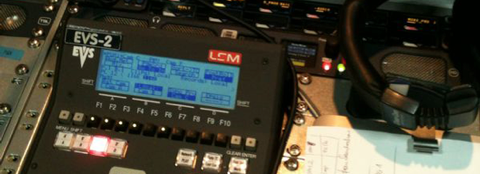
BB: Since when do you work as EVS operator
Roeland: “I have been working as an EVS-operator since 2008. Started in the Netherlands for Eyeworks and Endemol”.
BB: Which events did you already work on here in Brazil
Roeland: “I have worked for UFC coverages in Brazil since 2012, the Brazilian soccer championship, Libertadores Cup, world feed carnival 2014 in Rio de Janeiro and now I'm working for an American network at the IBC in Rio on the FIFA World Cup 2014”.
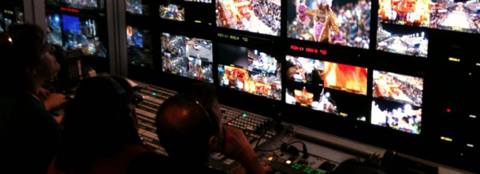
BB: What is the difference of the Brazilian events and events you worked on in the Netherlands
Roeland: “The difference between the events in Brazil and in the Netherlands is production and care. In the Netherlands, productions are bigger and made with more care. They do have all the equipment in Brazil to make events look really good but I think some of them maybe don't care enough to give it 100%. There's a lack of perfection at certain events. And planning is a big difference. For example, in Brazil I have never received a callsheet or any other useful info about the production. Even though many times things turn out to be fine "the Brazilian way”.
BB: How is communication with foreigners in general in your work
Roeland: “Communication has to be very good when working in EVS because a big part of the job is communication between director, producer and EVS. And most of the time communication has to be fast, because you work live”.
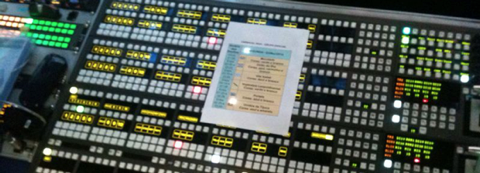
BB: What are the good and bad parts of Brazil as event host
Roeland: “Good part of the Brazilians is without a doubt the warmth character of the Brazilians. They are really open and enthusiast and there is always joy.
Any bad points would be the planning and the way they care about the production”.
BB: Do you notice a difference in foreign culture and your culture, in the way of working especially
Roeland: “A big difference in the two cultures is discipline and punctuality I think. Dutch people are very strict when at work. Brazilians are not. In Brazil it's very common that your colleague is a very good friend of you, in the Netherlands there's a clear difference between colleagues and friends. The majority of the cases at least”.
BB: How was it working on the last Carnival in Rio de Janeiro
Roeland: “Working at carnival was really spectacular. Like I mentioned before about the differences in size of the productions and care, you can compare the carnival for Globo with a great international event. I was very positively surprised”.
BB: Any specific technical difficulties during this event, and if so, these were due to what exactly
Roeland: “Work itself was normal at this event. We worked on the ultra slow replays which turned out to be very beautiful to show details about dancing. Very nice”.
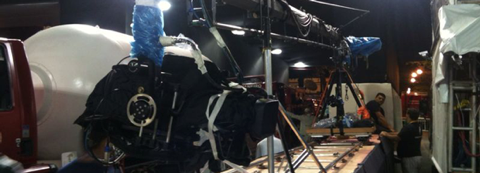
BB: Where there foreign broadcasters involved during the transmission
Roeland: “I believe not, the TV compound was from Globo only although the compound was quite big though”.
BB: What did you work on specifically during Carnival
Roeland: “We worked with the ultra slow replays of the dancers to show details and ordinary replays of the samba schools”.
BB: Which equipment did you use
Roeland: “EVS XT3. The newest model of EVS. And I-Movix”.
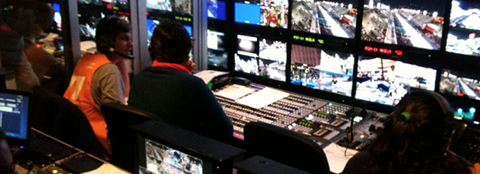
BB: Do you see a rise in the amount of (english speaking) Brazilian Broadcast Technicians needed during events in Brazil, and in which specific areas
Roeland: “Not really, this year you do but that has everything to do with the World Cup which is once. So not repeatedly I think”.
BB: Any good advice for the Brazilians in this area
Roeland: “It is always useful and of course important to be able to communicate in English”.
BB: How do you see the future for Brazilian broadcast Technicians the coming years with all upcoming foreign events
Roeland: “I think the Brazilian market is not going to change that much. The reason is because there are several big companies who provide their own services. There is not much of a freelance culture as there is in the US or Europe. People here prefer to work for a company instead of having their own business I think. So the market is not that competitive. There is Globo which owns almost all the channels here and than there's a long time nothing and than the rest.
But people should give their very best to show the international media out their that they're capable of producing big events”.
BB: What is the most important for you to be able to work with foreign companies
Roeland: “Foreign companies pay way better than the Brazilian ones. That for sure is an issue, further the production level is higher which makes it easier to work with them. Brazilian production level is not poor, but it's done by way less people so the conditions are harder and you can see that in the result”.
BB: Any other interesting things you have for us related to your work at last Carnival in Rio de Janeiro
Roeland: “Carnival was hard working but very satisfying and I really enjoyed it”.
Compilation of Carnival Rio de Janeiro 2014
So we hope this is, besides, fun to read, also a good help and insight information about broadcast events held in Brazil and what the future may hold.
Like us if you want on Facebook, and follow us on Twitter
mentioned:
Carnival Rio
EVS
I-Movix
FIFA worldcup 2014
Eyeworks
Endemol
TV Globo
UFC
Video News Ocean Journey The Oosterschelde
Video News Ocean Journey The Oosterschelde
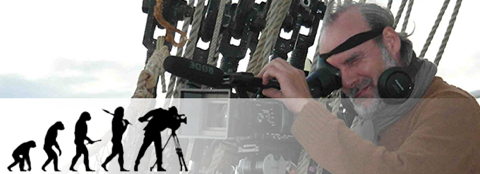
Route Brazil - South Africa 1st of April 2013 - May 2nd, 2013
Assignment: a video journal of a long ocean voyage about the life and atmosphere on board for six weeks . A Dutch three-masted tallship
The Oosterschelde from 1918 on a world trip along continents and historical VOC routes, from Rotterdam to Rotterdam.
After 26 years a former classmate from the Academy of Journalism nosed out that I, as journalist-filmmaker, live in Brazil and submitted me the following challenge ...
For a 13-episode documentary series for Dutch television we are looking for an adventurous director-videographer who can film independently, interview and edit on board. “You will do it for the adventure, because budget is tight, but expenses are paid and we will feed and accommodate you onboard”.
Well... a typical once-in-a-lifetime opportunity... crossing the Atlantic on an old Dutch schooner …. ?
A quick look at my calendar for the next few months , a few phone calls to my customers with long-term film projects ... and the decision came in an instant wink .. I grab my suitcase and prepare my camera kit !
Santos (BR) - Cape Town (SA)
This ocean voyage is known as one of the longest and hardest routes that the Oosterschelde carries on this world of 1,5 years. The route takes from the subtropical waters of Santos towards South Africa’s Cape Town, around the Cape of Good Hope. During this long crossing the authentic Dutch three-master must stand various challenges, the conjunction of two trade – currents; the tropical trade wind meets cold trade from Antarctica on the 35th and 40th parallel .. and that guarantees fierce storms and high waves, and all at an ocean depth of 5 kilometres.
Total distance of up to 3,500 miles, or 6,880 kilometres. This requires a strong western wind which should bring the three-master towards its eastern destination. But to find it, one must navigate to get there.
But before Cape Town will be reached, a secure check of the list needs to be done of what to bring. For more than a month at sea with full gear , you cannot afford to forget that one charger or cable!
Check... Enough batteries, rain gear for the camera , lens cleaner for the inevitable salt deposits, sufficient terrabites on the backup disks, since I will be shooting each day and everything in full HD.
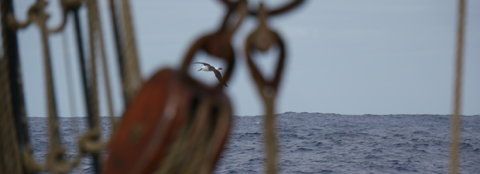
STORM
Just 50 kilometres off the coast of Santos, I already get my pick, force 9, rising to 10 Bft ... and that means storm!
Not knowing how often we were going to go through such a hell , I film just to be sure ... at least, as much as possible to maintain your standing and to avoid the big waterspouts across the deck. Filming on board a sailing ship
under those circumstances, staring through your viewfinder, provides a different perception of the reality around you. And that's tricky. Everything that is not fixed on lower and upper deck, thunders from baking to starboard.
And that goes for me as well, because ‘man overboard' really means overboard, and no one who can save you.
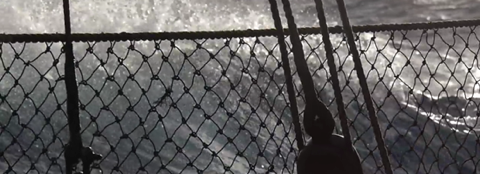
MOST REMOTE ISLAND IN THE WORLD
Highlight of the trip; halfway through the journey is the world's most remote island of Tristan da Cunha. With 2,265 miles on the map a stopover is scheduled here. The volcanic mountain in the middle of nowhere measures only 15 square kilometres and 2,060 meters high, counts just 260 inhabitants in almost complete isolation.
This colonial island that was discovered by the Portuguese in 1505 but eventually annexed two centuries later by the British. The island has a reputation of a ship graveyard, because the almost impassable coast and waves here over the centuries costs a lot of shipwrecks . If I succeed to go ashore, I 'm going to get a stamp in my passport first.
LAND IN SIGHT
After 15 days at open sea .. finally .. land in sight. It would be strange to feel land underneath your feet again. But unfortunately .. our party is negated by the local authorities of Tristan. The weather is not cooperating. It's too dangerous to dock at the island. So after a full day and night to float around in the hope that it would clear again around, we finally set sail for Cape Town . Disappointment among the guests and crew, but for me moments again for nice shots and quotes for the script.
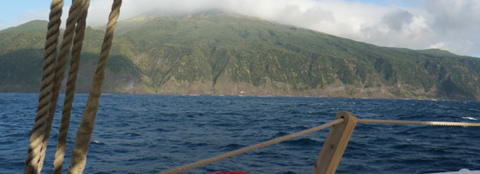
Standing up editing
At the end of the day when people are asleep or on a watch, I upload my footage to the backup. My cabin is not big enough for a small editing set installation, so sometimes you stand in front of your marine cage or improvise a quiet spot below deck to spot and assemble an edit timeline.
The days that follow to Cape Town under favourable weather conditions I interviewed the 12-member guest and 6 crew. Interesting to hear from each about his or her background for this project and their passion for ocean sailing.
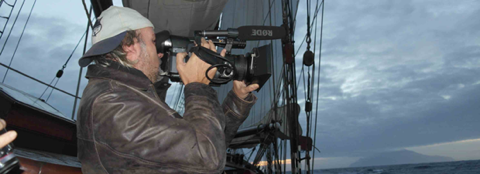
KILL YOUR DARLINGS
After more than a month, at a beautiful dawn we see the first outlines of the South African coast… Cape Town... we made it! The storms that would follow repeatedly during the trip, I and my gear overcome.
For the upcoming 15-minute episode I have more than enough terra bites of shots. So now up to the final montage and 'Kill your Darlings ...’
Filmmaker – director Ernst Daniel Nijboer
Visuals Studio Brazil
video:
mentioned:
Visuals Studio Brazil
TallShip de Oosterschelde
Tristan da Cunha
Authorization for Filming in Brazil
Authorisation for Filming in Brazil
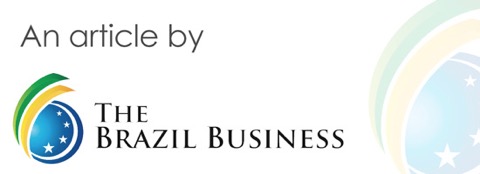
Foreign companies that want to film in Brazil need special documentation to do so legally. Read the article to learn what documentations are needs to be provided to act within the law when filming.
Foreigners who intend to make news reports, films, recordings or capture moving images in Brazil (with or without sound) have to previously ask for ANCINE's authorisation. ANCINE is short for Agência Nacional de Cinema, the national movies agency that is responsible for inter-mediating at the Brazilian diplomatic missions abroad, the requests for proper visa concession for technicians and artists, so they can participate in filming in the country.
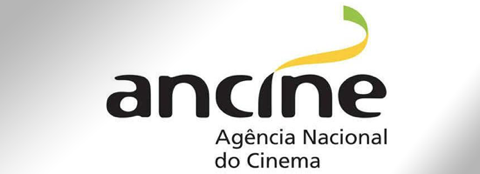
How to Request Authorisation
Apart from foreign journalistic productions, all of the others have to contact a Brazilian production company that will make contact with ANCINE. First, the Brazilian company communicates with ANCINE about its interest and responsibility in making the films or recordings, through a form available in this link. It’s also necessary to present the following documentation:
• Copy of the contract between the foreign production company or person that is legally responsible for the production, and the Brazilian production company, and should indicate the mutual responsibilities, form of payment and the expiration date of the contract.
• Copy of the translated contract mentioned, if it was written in a foreign language.
• Provisional plan of filming/recording, indicating the dates and the places (Municipality/Federal Unit) in the Brazilian territory where the works will happen.
• Copy of the identification sheets of the passport of each one of the foreign workers.

The Brazilian company will be the one responsible for making the customs clearance of all the temporary material used for the production, giving full support to the foreign company.
Any alterations in the originally established conditions have to be reported to ANCINE through a form available in this link. It’s also necessary to present the following documentation:
• Change in the Brazilian diplomatic mission to which the visa request is destined.
• Inclusion or exclusion of technicians and artists.
• Deferral/alteration in the temporary stay term of the technicians and artists in the country.
• Change in the places where the filming/recording will take place.
• Cancellation of the authorised activity.
The visa is issued abroad, on the Brazilian diplomatic missions, once ANCINE approves the concession of visa and provisional stay in the country.
The validity of the visa is determined by the mission, according to the length duration of the filming/recording chronogram.
It may also be necessary to ask for an authorization from CET, the Companhia de Engenharia de Tráfego, which is the Traffic Engineering Department, in case the filming is happening in some street. There are different authorisations in this case, whose prices vary from BRL 148.95 to BRL 1,747.45. The complete table of services is available in Portuguese, here, under the title “Filmagem, fotografia, produção de audiovisuais e similares”, which is filming, photography, audiovisual production and similar.
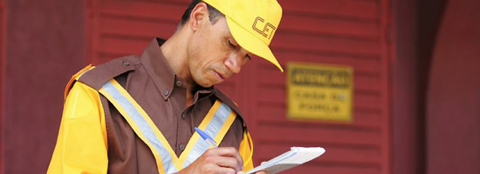
Some cities may have specific forms which must be filled in order to provide the authorization for filming, which must be checked at the City Halls.
Journalistic Productions
The production of foreign audiovisual journalistic works have to be communicated straight to the Brazilian diplomatic missions abroad, so that the proper authorisations can be issued. In these cases, the people going to Brazil to work can apply for a temporary visa as foreign newspaper, radio, television or agency correspondents. There may be internal demands, for instance, a special authorisation to film in a hospital, but these are local specifications, not migratory ones, and need to be checked in the specific places where the filming will occur.
A big thank you goes to our friends at The Brazil Business who were so kind letting us use this very informative post.
Be sure to check the Broadcast Brazil Facebook page and LIKE us.
Lot's of news, photo's and info for broadcasters, webcasters and mobile producers in Brazil.
Brazilian Cinema and International Events
Brazilian Cinema and International Events
Most of the foreigners might have never heard from ANCINE, well that is not that strange since it is the government institution for Cinema.
For 2014 this institution applied new rules in terms of promoting and stimulating national cinema outside of Brazil, which is great!

Here some more information about the publication made by ANCINA
"ANCINE publishes rules to support the participation of films, projects and professional programs in international events in 2014.
This Program supporting festivals shall also include projects in workshops.
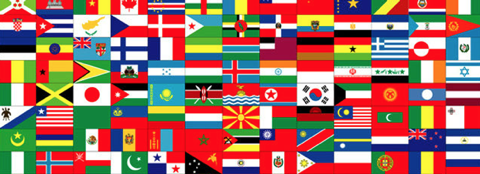
Aiming to encourage the promotion of Brazilian audiovisual production abroad and increase the participation of Brazilian companies abroad in the audiovisual market ANCINE renewed it's program for the year 2014, with two support programs aimed at the international area.
These programs seek to contribute and facilitate the participation of national films and projects at major festivals and workshops of the international cinema, besides also the participation of the sector in market related events and business meetings.
"We believe that the format they will implement this year, through the extension of both programs will allow a more comprehensive role in enabling the presence of Brazilian companies and professionals in major international events in the audiovisual sector. There is a complementarity between the three lines that make up the programs because they make us understand the development and presentation on one hand, and the negotiations in order to produce and make the product move in the international market, "said Rosana Alcantara, director ANCINE.

The Support Program Participation of Brazilian Movies at International Festivals, launched in 2006 by ANCINE, assists with financial services and resources, depending on the event, for the participation of short, medium and Brazilian feature films selected for festivals abroad. Starting this year, the program shall also include financial support for selected projects for international workshops
The International Advisor for ANCINE, Eduardo Valente, justifies the inclusion of laboratories/workshops in the program with the assessment that "these events today have outstanding importance in the international projection of work and increasingly curators go to these events to invest in these works. With this increase, the total number of events in the program reaches 107, throughout the year."
This way we see that the audiovisual market is not only expanding one way, which is mostly foreigners coming into Brazil, but that we can expect the coming years a rise of Brazilian products and professionals appearing in the foreign markets as well.
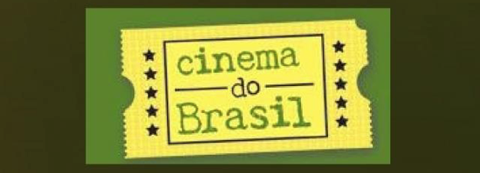
Great news, because this will stimulate the international market for Brazil and in the coming years prepare the Brazilian audiovisuals even better for the Olympics.
On this site you can read more about the program, it is in Portuguese but Google Translate will help out pretty well ;-)
Mentioned:
ANCINE
Interview: Max Noach from SSL

We had the pleasure of meeting Max already a couple of times during fairs in Brazil at the SSL booth, he was so kind to do an interview with us about his work at SSL and his point of view on the Brazilian market.
BB: Tell us who you are Max
Max Noach: “I am a Dutch citizen, born in Belgium and educated in French. I spent 10 years living in the UK when I first joined SSL in 1992, and have been living in Brazil for 10 years now.”
BB: What is your occupation
Max: “I am the Area Sales Manager LatAm for Solid State Logic”.
BB: How long do you work for SSL
Max: “I worked from 1992 to 2002 in various sales roles, and rejoined the company in February 2013”.
BB:How long do you work in the South America region
Max: “Since December 1992 - coming close to 21 years now”.
BB: How long does SSL exist, and how long in Brazil
Max: “SSL was founded in 1969 in Stonesfield, Oxfordshire, England, UK. The first SL 4000 G console was installed in Rio de Janeiro in 1989 (that commissioning engineer, Niall Feldman, still works for SSL and is now Director of New Products) and we pro-actively started working in Brazil in 1993”.
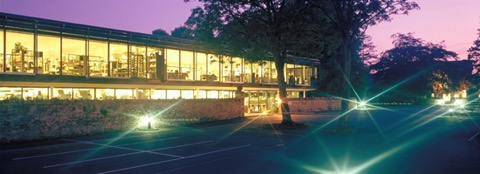
BB: Which product is most popular in Brazil
Max: “Difficult question to answer. Over the years, we have produced a wide range of products for a variety of applications. If we were to consider sheer unit numbers, I guess that Matrix and X-Rack win the trophy. If we were to look at turnover, Duality is the winner. These numbers might be superseded in the near future with the introduction of Live, our newest console for live sound applications”.
BB: Did you see a growth in audio/video related material in Brazil
Max: “Sure! With the advent and expansion of cable TV, digital terrestrial TV and web-streaming, we have witnessed sustained and continuos growth in this sector of the industry”.
BB: Which section in the audio/video market is strongest for SSL in Brazil
Max: “Our company and solutions traditionally attend to the upper tier of the market, i.e. large shows, complex sport events, mobile units requiring high capacity and quality audio”.
BB: We saw you at the AES and Broadcast&Cable, which other fairs in South America people and businesses can find SSL
Max: “We have attended local trade-fairs in Chile over the past 2-3 years. We are looking at exhibiting at ExpoMusic in 2014, Caper in Argentina, and a show in Colombia. We regularly organize workshops and roadshows with our local partners”.
BB: How is business and sales different from Europe & USA in Brazil
Max: “To state the obvious, custom duties and taxes, as well as the exchange-rate instability make it difficult for anyone to plan anything here. Also, the political and economical situation is very different in Brazil from more traditional markets such as the USA or the EU. This influences not just SSL's business, but nearly all sectors of the economy, making forecasts and planning almost "black science".
BB: Is the english language still a problem in communication
Max: “Yes and no. Yes if one considers the average fluency in English of the people we deal with on a day to day basis. No, because companies in South America require that their top managers possess a decent command of English. At SSL, we beg to be different: I'm fluent in both English and Portuguese, and my Spanish is up to a decent standard (I won't mention Dutch or French, only relevant in a couple of countries in South America)”.
BB: Are you partnering with other foreign companies here in Brazil
Max: “No. Our partners in Brazil are all established in Brazil”.
BB: How do you see the broadcast market in 2014 due to world cup
Max: “We see opportunities of course. Not just in the Broadcast market, but also in the Live sound market thanks to the many parallel events that will happen during the World Cup”.
BB: Which company is your biggest opponent in Brazil
Max: “I wouldn't say “opponent”. We have competitors, of course, as any company would. They tend to vary according to the projects and the markets - I couldn't per se qualify one as the “biggest” either”.
BB: Any surprising challenges in Brazil
Max: “As you may well know and have experienced yourself, Brazil is a territory with many challenges. After our 20+ years experience in the country, anything hardly surprises us anymore. And when it does, it tends to be in a positive way”.
BB: Are there new upcoming products you can tell us about
Max: “We just revealed two new broadcast products at IBC: the first Madi-Dante Bridge designed for Broadcast applications and the LMS-16, a revolutionary high-capacity loudness monitor that works together with our products or that can integrate as a stand-alone unit in broadcast installations.
SSL has a life-long history not revealing upcoming products before they are ready to be demonstrated and ready to ship. But we are having good news for you all.
There is close to a week left before the AES in New York and SSL will have 5 new products, yes, 5! Each of them worth the travel.
For Musical Production, we will have the Matrix2 and Sigma
For Live Sound, the Live, seen first time at the fairs in America
For Broadcast, our new Madi-Dante bridge, and the LMS 16, Loudness multichannel monitor.
Besides this, we will have the Duality ProStation, the C1- HD with V4, an AWS 948, Nucleus and of course our range of Converters and effects/processors at our stand.”
To register for the fair you can click here. To mark a SSL demo, click here
Be sure to check the Broadcast Brazil Facebook page and LIKE us.
Lot's of news, photo's and info for broadcasters, webcasters and mobile producers in Brazil.
mentioned:
SSL
AES
Expo Music
Caper
Broadcast & Cable
IBC
Remittance of International Payments
Remittance of International Payments

Brazil is a new investment target, but the country still presents many problems for investors that want to participate in the Brazilian market. This article outlines these problems and also proposes solutions to make business in Brazil a clearer and more successful process.
Brazil is a developing country in ascension with many attractive features for investors. With a vast territory full of natural resources and opportunities for expansion. In addition to the growing Brazilian economy and the increasing purchasing power of the population, the country has caught investors attention worldwide. Making Brazil a very appealing area for foreign financial transactions.
Business Environment in Brazil
A recent report developed by the World Bank ranked the economies of 185 countries according to the ease of doing business. From 1 to 185, the countries are classified in accordance by their regulatory environment for starting a new business.
If the environment is favourable to open a business or a new business operation the ranking is lower, closer to 1, and if the regulatory conditions are unfavourable the ranking is higher, closer to 185. Brazil was ranked 130th, a poor result in comparison to other South American countries, such as Argentina (124th), Paraguay (103rd), Uruguay (89th), Peru (43rd) and Chile (37th).

Problems to be Confronted
The low position of Brazil in the study can be explained by the number of necessary days it takes to open a business in the country. In Peru it takes 60 days and in Chile 32, while in Brazil the whole process can be completed in a staggering 156 days.
The Bureaucracy Barrier
It is clear that bureaucracy has decreased the ease of doing business in Brazil. Even though the country has become an important target for foreign investments some Brazilian problems cannot be ignored.
The country is a victim of a system of administration with many divisions, rules, controls and redundant procedures that, most of the time, are unnecessary for the opening of a business.
The bureaucracy in Brazil can be so overwhelming that even Brazilians get confused. This type of system nurtures the idea that every procedure in Brazil takes much longer than it should actually take and also diminishes the government's efficiency.
Delays and Clearer Contracts
Not only is their unnecessary time spent on opening a business in the country, there is also a problem for investors in Brazil. Payment can also be an issue, especially regarding delays. Brazilians are recognized worldwide for their ability to be late and unfortunately this ability can be also perceived in payments and in financial remittances.
Not all Brazilians have this problem, but in order to be cautious, the establishment of a good contract with explicit and verified information is the best option to guarantee the success of any type of business in Brazil.

Avoiding Complications with Bank Transfers
To avoid any type of trouble when doing business in Brazil it's important to understand how Brazilian banks work. Just like in any part of the world, banks in Brazil work with digital systems and systems don't always recognize mistakes.
For a financial transaction in a bank to be processed correctly, it is necessary to present the exact information that the bank requests. To be sure that the information requested by a bank is the same provided by the person that is sending the money, double-check the information is the most advisable option.
Razão Social and Nome Fantasia aren't the Same Thing
The lack of information or errors is a normal complication encountered by legal entities, on reason is due to the fact that in Brazil companies have two different names: Razão Social and Nome Fantasia. This part could be tricky for foreigners, since Nome Fantasia and Razão Social aren't universal terms. Both are nuances of Brazil therefore being unknown terms abroad. However, the knowledge of their meanings is fundamental to guarantee the success of a foreign payment.
• Razão Social: It's the nome comercial, denominação social or firma empresarial, which means the name with the company as it's registered in Brazil.
• Nome Fantasia: The name which the company is commonly known as, which can also be called the nome fachada or marca empresarial.
Example: McDonald's is a fast food restaurant popularly known by its Nome Fantasia, McDonald's. The Razão Social of McDonald's is registered as Arcos Dourados Comércio de Alimentos Ltda.
Usual Mistake
To money transfers by a company must indicate the Razão Social in the bank system. The biggest mistake made by foreigners is that they usually send their money with the Nome Fantasia of the company, which hinders the data matching of the bank system. If the information submitted by the foreigner doesn't correspond to the data registered in the bank the transaction will not occur, and the money will be returned to the sender or remains with the bank.
The info graphic below here shows ways to Send money to Brazil or to Abroad
We hope this information helps to give you a better understanding about the financial world and doing business in Brazil, and if you would like to read more articles related to this, let us know!
A big thank you goes to our friends at The Brazil Business who were so kind to write this for us.
Be sure to check the Broadcast Brazil Facebook page and LIKE us.
Lot's of news, photo's and info for broadcasters, webcasters and mobile producers in Brazil.
UFC in Rio de Janeiro
UFC in Rio de Janeiro
The 2nd and 3rd of august BroadcastBrazil was in Rio de Janeiro, Brazil, at the UFC event.
We talked with Fernando Figueira, one of the Camera Operators of this UFC show, and had the chance to ask him some questions.
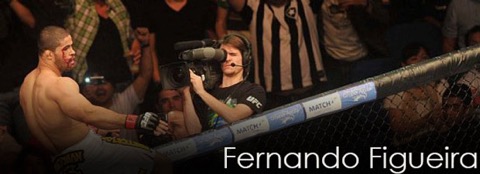
BB: So Fernando, please tell us what is your function, and what does it include
Fernando: “I am one of the Hand Held Camera Operators for the UFC events in Brazil”.
BB: How many shows are you on UFC in Brazil
Fernando: “I have worked at all the UFC Shows in Brazil, except the one that took place in Fortaleza”.
BB: What is the best part of the UFC events
Fernando: “The best part of the UFC shows is to be able to work with good professionals from all over the world”.
BB: What is the difference of Brazil and other countries at UFC events
Fernando: “At the UFC everything is detailed and structured. We receive a minute by minute script on each show, what makes our life much easier”.
BB: How is communication with foreigners in general in your work
Fernando: “ I am used working with a lot of foreigners, so I don't have any issues on communicating with them and I also made really good friends at those events”.
BB: What are the good and bad parts of Brazil as event host
Fernando: “UFC is getting bigger and bigger each day in Brazil, so hosting an event in different cities of the country will help it get even more popular.
The most difficult part of hosting international events in Brazil is to gather a good English Speaking Crew. We do have a lot of good professionals in the TV area but not all of them speak and/or understand English”.
BB: Do you notice a difference in foreign culture and your culture, in the way of working especially
Fernando: “On TV, all the engineering is the same. Sometimes we have to change the way things are done to accomodate a specific request from a different way of doing TV. But, as I mentioned, technically the process is the same all over the world. What really matters is the final result and a happy and satisfied client, no matter where they come from”.
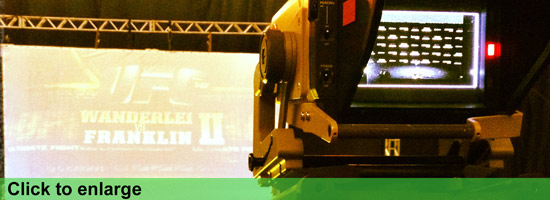
BB: Any specific technical difficulties this last UFC, and if so, these were due to what exactly
Fernando: “No specific problems at any of the UFC events”.
BB: Any good advice for the Brazilians in this area
Fernando: “It is very important to learn a second language, preferably English, due to the upcoming events in Brazil”.
BB: Do you see a rise in the amount of (english speaking) Brazilian Broadcast Technicians and Cameraman needed during the UFC in Brazil, and in which specific areas
Fernando: “ Till today it is still very hard to gather an english speaking crew here in Brazil.
BB: How do you see the future for Brazilian broadcast Technicians the coming years with all upcoming foreign events
Fernando: “Brazil has a really good future since we will have big events as the World Cup and Olympics. We are getting more investments in the area and that makes this kind of work stay even after these events”.
BB: What is the most important for you to be able to work with foreign companies
Fernando: “We are always learning, so be able to work with people from all over the world only brings more knowledge”.
BB: What kind of gear do you use
Fernando: “On UFC shows we work with an OB Van with 16 Grassvalley HD Cameras and 5.1 dolby áudio”.
BB: Any other international events you did this year? If so which ones and what was your function there.
Fernando: “I did the World Youth Day in Rio de janeiro where I worked as Producer, also I did Pororoca Live for CCTV China as an Transmission Coordinator”.
World Youth Day:
Pororoca Live Event, behind the scenes:
So we hope this is, besides, fun to read, also a good help and insight information about foreign broadcast events held in Brazil and what the future may hold.
More photo's available on our Broadcast Brazil Facebook page, you can find them here.
Like us if you want ;)
And see our former blogposts about the UFC event held in Belo Horizonte, Jaraguá do Sul and Fortaleza
mentioned:
UFC
GrassValley
Pororoca
World Youth Day
CCTV China
UFC in Fortaleza
UFC in Fortaleza
The 6th till 8th of june BroadcastBrazil was in Fortaleza in the state of Ceará, Brazil, at the UFC event.
We talked with Marcio Moreira, the Image Director of this UFC show, and had the chance to ask him some questions.
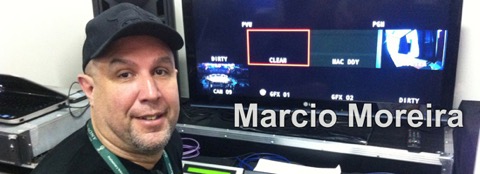
BB: So Marcio, please tell us what is your function, and what does it include
Marcio: “I am an image director and to get here I learned photography, Studio and external camera, graphics, video control cameras and also followed the work of other directors in the most varied areas of tv production”.
BB: How many years are you on UFC
Marcio: “I don’t know exactly the years, but till now I have done 5 UFC shows here in Brazil”.
BB: What is the best part of the UFC events
Marcio: “There is not e specific ‘best part’ at the event. The production for sure is great and very well organized. It is an event full of highly trained professionals”.
BB: What is the difference of Brazil and other countries at UFC events
Marcio: “Working also with music shows, live tv programs, and sports in General, the difference is the way of working with the Americans.
Everything is well rehearsed and scripted”.
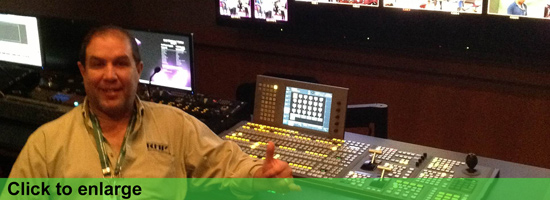
BB: How is communication with foreigners in general in your work
Marcio: “My communication is very good due to speaking English. We talked about the whole operation of the switcher and the camera movements before and during the events so there were no doubts left”.
BB: What are the good and bad parts of Brazil as event host
Marcio: “Brazil is a very big country. Has a geography very differentiated from other places and has a very large number of spaces for this type of event. The problem is that the best work and venues are located in urban areas and with many local rules, such as for example the city of São Paulo that has a time limit for a big event to end. In Brazil we have a lot of good professionals, but most of them do not speak a second language”.
BB: Do you notice a difference in foreign culture and your culture, in the way of working especially
Marcio: “The main difference is the way the event is produced. All those involved are very professional and organized”.
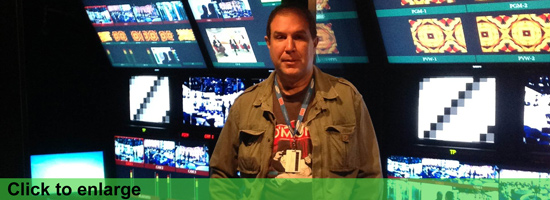
BB: Any specific technical difficulties this last UFC, and if so, these were due to what exactly
Marcio: “In the operating area I had no problem”.
BB: Any good advice for the Brazilians in this area
Marcio: “One advice that I can give to professionals in this area is to learn foreign languages, because we are having more and more international events”.
BB: Do you see a rise in the amount of (english speaking) Brazilian Broadcast Technicians needed during the UFC in Brazil, and in which specific areas
Marcio: “I realize that the need for professionals is very high in all operational areas, but having professionals for these areas that speak english is still very difficult”.
BB: How do you see the future for Brazilian broadcast Technicians the coming years with all upcoming foreign events
Marcio: “I see a good future for the Brazilian technicians. I believe many invest heavily in operational expertise, given the demand”.
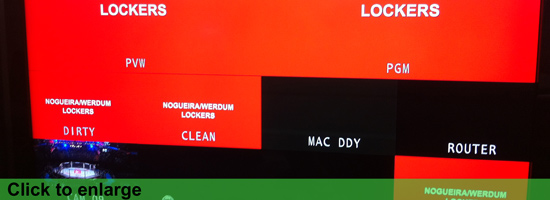
BB: What is the most important for you to be able to work with foreign companies
Marcio: “To have a lot of knowledge in the making. Always do your best. Cooperate and work as a team”.
BB: What kind of gear do you use
Marcio: “My equipment is the Switcher that has several video signals and graphs that are used during the event”.
BB: Tell is some more about this equipment/brand/type
Marcio: “The equipment tends to be Sony or GrassValley with 8 video outputs at least, 2 key-ers and 2MEs”.
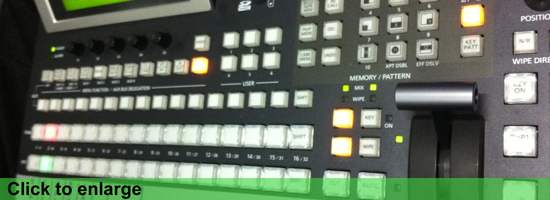
BB: You work both in Sao Paulo and in Rio, do you see already a difference in the Broadcast field in these 2 cities, if so in which way?
Marcio: “The professionals of the two cities meet the needs of all types of events. The difference is that in Sao Paulo, the number of events is greater”.
BB: What kind of events do you prefer to work on, sports, live music etc..
Marcio: “I like to work in all sports and mega musical shows, nationally and internationally”.
And of course, do you have other interesting notes to share from last UFC event:
“It is very good to be in the UFC and to be working with high-level professionals. It ss an event to work and learn”.
So we hope this is, besides, fun to read, also a good help and insight information about foreign broadcast events held in Brazil and what the future may hold.
More photo's available on our Broadcast Brazil Facebook page, you can find them here.
Like us if you want ;)
And see our former blogposts about the UFC event held in Rio de Janeiro, Belo Horizonte and Jaraguá do Sul
mentioned:
UFC
NEP
NYDigital
Panasonic (Switcher)
UFC in Jaragua Do Sul
The 16th till 18th of may BroadcastBrazil was in Jaraguá do Sul in the state of Santa Catarina, Brazil, at the UFC event.
This big fighting event was held in Arena Jaraguá.
We met with Peter Addams, the Audio Mixer of this UFC show, fortunately we had the chance to ask him some questions and check out his workplace after the show.
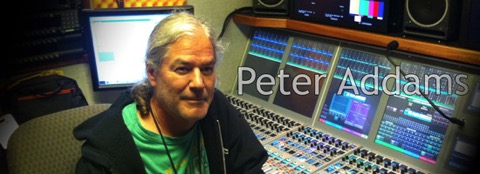
BB: So Peter, please tell us what is your function, and what does it include
Peter: “I am a Broadcast Show Mixer, Senior Audio. Lead of the audio department and I mix the television show. Also I plan the set up and co-ordinate all equipment with the Technical Manager”.
BB: How many years are you on UFC
Peter: “My first UFC event was in February 2003 so that makes a total of 10 years already”.
BB: What is the best part of the UFC events
Peter: “That's easy - our Audio crew. We have a core group of A2's that are very talented, hard working and don't whine (too much). They complement one another and work well together. Though each is a specialist they will go into each other's areas as needed”.
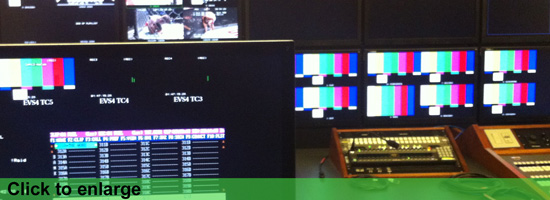
BB: What is the difference of Brazil and other countries at UFC events
Peter: “From my perspective? In the USA we are familiar with the mobile units we use. Though the mobile unit in Brazil was a joint venture between American based NEP and Brazilian based Casablanca, it was different than most of the mobile units we would use in the USA. This manifested itself in capacity and accessibility. We had fewer powered intercom channels than we usually do, couldn't access as many ports in the intercom system, the desk was only 48 faders instead of the usual 64 or even up to 144 on the surface as in USA. This is typical when we go overseas. In Europe we often use UK mobile units, other countries might involve a "fly pack." The challenge is to provide all the technical elements of our show regardless of the facilities we are using”.
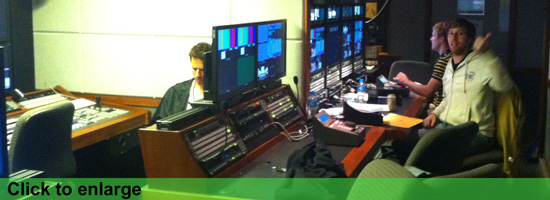
BB: How is communication in Brazil Challenging
Peter: “As I don't speak Portuguese. In the work environment I was really only dealing with English speakers so it wasn't a problem”.
BB: What are the good and bad parts of Brazil
Peter: “As event host nothing that effected me aside from the catering”.
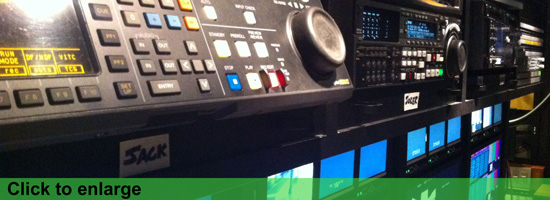
BB: Does the latin culture influence the way of working
Peter: “In my line of work this does not influence me”.
BB: Any specific technical difficulties this last UFC, and if so, these were due to what exactly
Peter: “It was the first time we used the mobile unit, that's always a challenge. Fortunately NEP sent Nick Romano and others who had done our show before on other mobile units”.
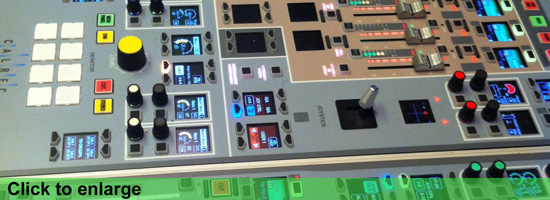
BB: Any good advice for the Brazilians in this area
Peter: “Obviously if you're working with USA television personnel, who tend not to master any other language aside from their own, English fluency is an asset. Also, understanding the urgency and immediacy that characterizes American television is important”.
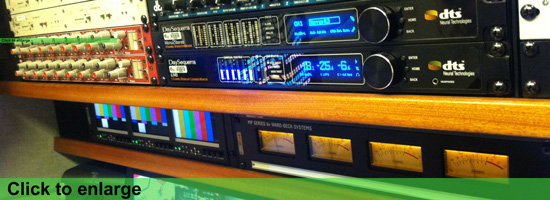
BB: And of course, do you have other interesting notes to share from last UFC event
Peter: “Due to big distances in Brazil, having the hour long bus ride to and from work makes a long day even longer.
The Hotel bar could've been open later and been more interesting. And why no Gin & Tonic? :)”
So we hope this is, besides, fun to read, also a good help and insight information about foreign broadcast events held in Brazil and what the future may hold".
More photo's available on our Broadcast Brazil Facebook page, you can find them here.
Like us if you want ;)
And see our former blogposts about the UFC event held in Rio de Janeiro and Belo Horizonte.
mentioned:
UFC
NEP
Casablanca
Interview: Marcio Zukin, CTO SimTV
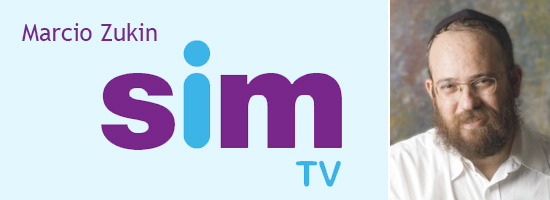
IPTV News Editor Jamie Beach interviews Marcio Zukin, CTO of Brazilian over-the-top video service Sim TV, on plans to move into transactional and ad-supported offerings, the television services that Brazilians value most, and the opportunity created by pay-TV piracy.
Marcio will be speaking at the TV Connect Latin America 2013 event taking place in São Paulo on 2nd-3rd July. For more information and to register, please visit latam.tvconnectevent.com
Jamie: Can you tell us a little about SimTV’s connected TV initiatives to date?
Marcio: Our connected TV initiatives include subscription VOD and live TV. SimTV was designed for delivery on every kind of device and also through an IP Box.
Eventually the platform will be developed in order to feature transactional and ad-supported services.
The focus of the project was to provide a very robust solution, using adaptive bit-rate technology, CDN networks and global data centres in the cloud, in order to deliver the best interface and a user-friendly workflow to the customer.
Jamie: What do you think Brazilians value most in a television service, beyond linear programming?
Marcio: There is a need to differentiate between content and service. In terms of content, Brazilians in general value football games and sports, movies, kids programming and comedies or sitcoms.
Regarding services, Brazilians value innovation, programmes with social comment and interaction, and which are up-to-date and available on a 24-hour basis.
Jamie: How big a problem is pay-TV piracy in Brazil?
Marcio: Pay-TV piracy in Brazil is not a problem, it is an opportunity, and a big one.
Let me explain. In my opinion, people turn to piracy for a number of reasons, almost as an ‘after the fact’ event.
If people would have a service, with reasonable quality, at an affordable and fair price, with dependability and good customer care, there would be no need to resort to illegal practices regarding pay-TV.
Many initiatives have already demonstrated this vision.
Jamie: What growth opportunities can you see in the pay-TV market?
Marcio: The pay-TV market has huge growth opportunities, in volume and quantity. Various industry surveys project that there will be 4.4mn active clients for IPTV services by 2017 in the Latam countries alone.
A huge variety of content and types of service is emerging: for example, an Italian that lives in Rio could watch live an Italian game in Recife at his tablet, early in the morning while still in bed.
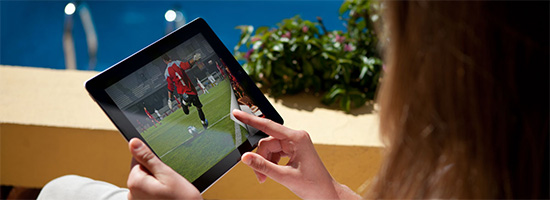
Then a few hours later he could be watching a recent specific Italian movie back in his apartment simultaneously (in a social network) with his friends that live in Italy.
While watching the movie, he uses the tablet as a second screen not only as a remote control but also to buy something that appears in the movie in an e-commerce site, or get more information on historical events related to a character of the movie, post a note on Facebook, and so on.
Event video:
Be sure to check the Broadcast Brazil Facebook page and LIKE us.
Lot's of news, photo's and info for broadcasters, webcasters and mobile producers in Brazil.
Mentioned:
Sim TV
TV Connect Latam
Genelec - Interview with Miguel Dominguez
Genelec
Interview with Miguel Dominguez
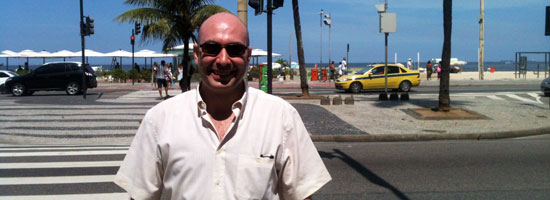
We had the pleasure to meet Miguel during his latest business trip in Brazil. Having a good lunch in Copacabana with a lovely beach view, it was the perfect place to get to know him and Genelec a bit better. Since Genelec is entering the Brazilian market we though it interesting to have Miguel tell us more about his points of view of the Broadcast Market.
BB: Miguel, what is your occupation
Miguel: ”I work for Genelec as Area sales manager”
BB: How long do you work for Genelec
Miguel: “Since August 2012”
BB: How long do you work in the south america region
Miguel: “About 10 years”
BB: How long does Genelec exist, and how long in Brazil
Miguel: “Genelec was founded in 1978. This year is the 35th Anniversary. Pride Music, the current distributor, has been working with Genelec the last 7 or 8 years, but you can find Genelec monitors in Brazil since the 80s and 90s.”
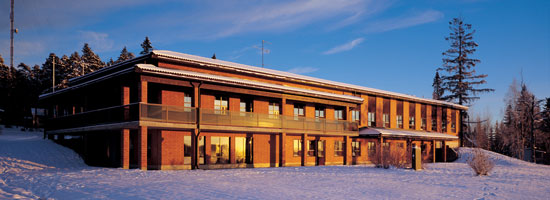
BB: Which product is most popular in Brazil
Miguel: “The top seller in 2012 was the 8030A, as it is all around the world.”
BB: Did you see a growth in audio/video related material in brazil
Miguel: “This is what the AV industry is probably expecting; Brazil is heading the technical improvements in the Broadcast market in the Latin America region. However, I think the main growth will happen within the next two years probably.”
BB: Which section in the audio/video market is strongest for Genelec in brazil
Miguel: “The top clients in number of units purchased are broadcasters, as usually happen everywhere for Genelec. I would expect to find an increased market and also more diversified in the short-medium term.”
BB: Official representatives are situated where, and how many
Miguel: “Genelec tries to work with only one exclusive distributor, although this depends very much on each country and the potential markets. We have right now in Brazil only one distributor, Pride Music, based in Sao Paulo, but they work with dealers in all the main cities of Brazil.”
BB: How is business and sales different from Europe/USA in brazil
Miguel: “The main difference is probably the difficulties in customs to import any product in Brazil. This changes the rules quite significantly.”
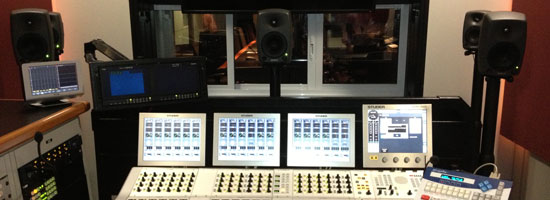
BB: Is the english language still a problem in communication
Miguel: “I don't really know since I communicate in Portuguese with my brazilian clients, or at least in ¨Portuñol¨, since I am Spanish native. I would think that in the professional level most of the engineers are able to speak in English and they don't have that lack of communication. Genelec hired me thinking in to open new direct channels of communications with the Portuguese and Spanish speaking markets in Latin America.”
BB: Are you partnering with other foreign companies here in brazil
Miguel: “Not right now although we have very good relationships with many manufacturers. We are discussing some possibilities with Dolby, and we are always in touch with manufacturers of mixers, microphones and other colleagues in the pro audio industry.”

BB: How do you see the broadcast market in 2014 due to world cup
Miguel: “The purchases of equipments that the Broadcasters can need for the world cup should be done within the next 12 months, probably less. However, the brazilian broadcasters are quite well equipped technologically. Another different issue is if they will have enough resources to cover properly all the events, but, if they don't have them and they don't want to buy them, the market will be interesting for foreign rental companies. Anyway it is a great opportunity for improving the technical development, already high, of the brazilian broadcast market.”
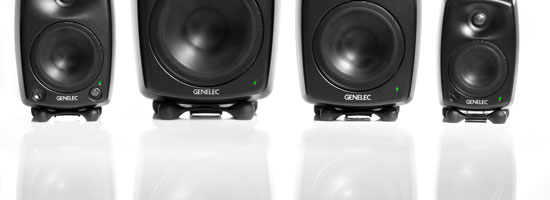
Miguel: “Due to the complicated system of taxes the manufacturers of less expensive monitors are usually hardest competitors. However Genelec is in a range of quality, reliability and performance where our typical competitors in Europe or USA are not real opponents in Brazil.”
BB: Any surprising challenges in brazil
Miguel: “Surprises depends on the open mind you have. In this industry usually any challenge can be faced up working hard and thinking smart. Perhaps the main challenge can be to change the trend of the brazilians of buying abroad, although it is not a surprise.”
BB: Are there new upcoming products you can tell us about
Miguel: “There are, but it is still too soon to talk about it. We will have many exciting new products along this year. Genelec has always tried to lead the industry of active monitors and I really think we are right now offering the state of the art technologies and it will be even better in the close future.”
So we hope this is, besides an interesting piece to read, also a good help inside a companies view and interests in the Brazilian market and future possibilities.
Be sure to check the Broadcast Brazil Facebook page and LIKE us.
Lot's of news, photo's and info for broadcasters, webcasters and mobile producers in Brazil.
mentioned:
Genelec
Dolby
Pride Music
English and "Consequences"
English and "Consequences"
Since we are an English focused website about the Broadcast, Webcast and Mobile world here in Brazil we really felt the need and of course pleasure to show you the following commercial from English school CCAA. They are known for using famous American actors for their marketing, but this is the first time we came across a great commercial from them.
Ok, besides that it is a great and funny commercial, the boy saying proudly Hotsydoggy (it's hotdog) it shows exactly the main issue in Brazil, and also one of the reasons we created Broadcast Brazil. There is such a big shortage in 'real' English speaking personnel in the Broadcast world in Brazil that these "consequences" as in the video do happen, of course not being attacked by sharks ;-), but in a practical real way.
For example:
A Video Director needing to give directions to a cameraman while the camera operator speaks only "more or less" English (claiming he speaks it) Consequence? Wrong shots, misplaced timing.... And so on. Of course we know that technical talk is different in each country, even using the English language, and that is why it is even more important to learn and really dominate your English. Besides that all us English speaking people in this Broadcast world are needed the coming years more and more!
The Shark Attack!
You can see the Shark attack as a metaphor for the foreigners attacking your jobs and if things don't change many people from other countries will be doing the work at coming World Soccer and the Olympics, it sounds a bit harsh, but it is a becoming reality. This commercial shows us the importance of being able to communicate worldwide and don't have to worry for "The Consequences" Here also the making of video, which is worth your time!
We'd love to hear your opinion about this commercial.
Broadcast Brazil
mentioned:
CCAA
The Journey Of A Boskalis Dredge by Visuals Studio Brazil

RIO DE JANEIRO – Like in any career a workday of a journalist-director has its ‘everyday’ projects. But with some projects you only realize afterwards how special they really were. This reflection also occurs at this time of writing, when Broadcast Brazil asked me to put something down on paper about this recent documentary-project.
Often you only receive a few words; "... special transport ... a dredger through the jungle of Suriname on ... 350 tires ... say a sharp
challenge for both man and machine ... ". But as a director you instantly feel that with this meagre list of ingredients you have something special in the hands.
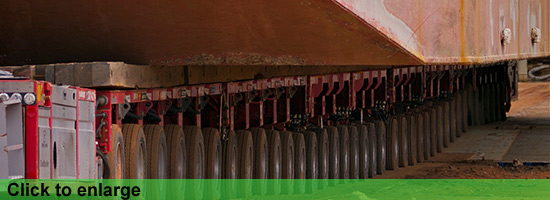
After the first contact with the Communication Department from the headquarters of Royal Boskalis Westminster, I was redirected to the regional manager in Paramaribo for further planning and details. He told me because of persistent and heavy rainfall in the last weeks, the transport has been postponed several times. Suriname deals with an unusual lot of water, where in a few weeks time more inches dropped then usually throughout the entire rain season.
But as experience shows ... delay is inherent in the maritime industry. Despite tight time schedules and a detailed scenario, the factor "weather" always comes unpredictable. And so the initial date for the transportation was shifted to three weeks later, hoping for some drier days. All in standby mode, meaning the calendar blocked, including my Belgian assisting cameraman who will fly straight too Paramaribo.
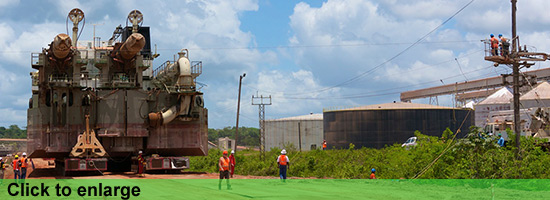
But unexpectedly the standby was two days shortened by an email with green light. The last two dry days indicates the start of an unique mobilization plan for the transport of one of the largest dredgers from the Boskalis fleet, the Orion. A huge cutter dredger of 1813 ton, 74 meters long and 15 meters wide, with its destination a bauxite mine south of Paramaribo. Here the Orion will excavate the valuable raw material for aluminium, for the next two years.
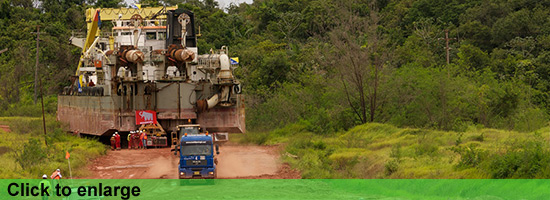
A month earlier, the Orion was put on a special transport ship, the Roll Dock Sea, in Abu Dhabi. Once arrived the cutter ship is put ashore at Paramaribo by means of a special constructed jetty to be able to put the ship on a 'train' of trailers, consisting of 305 air tires from the Dutch transport and heavy lifting company Mammoet.
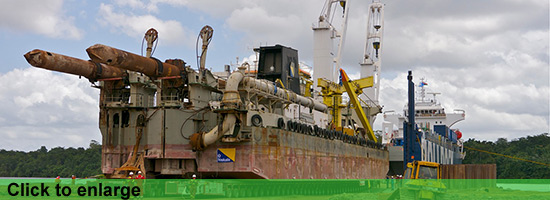
A carefully elaborated mobilization scenario shows the various 'obstacles' on the route during 14 kilometers during 13 days, from jetty to the final destination, a dry mine pit in a jungle lake.
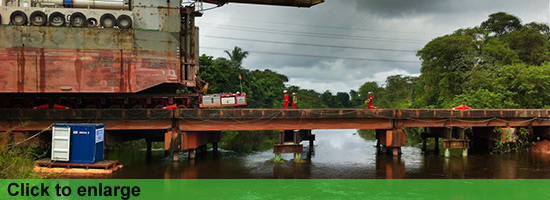
The Orion faces numerous challenges such as (too) low hanging power lines for its 15 meter height. Three sets of power masts had to be lifted, causing a temporarily electricity cut in the biggest part of Paramaribo city for a few hours.
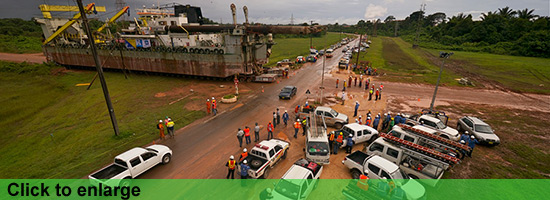
Another challenge is a narrow bridge that needs to be crossed. For this successful passage a special team reinforced and broadened the small bridge. For a (too) low viaduct a special bypass road was constructed, but the ultimate challenge the Orion had to deal with is the muddy and slippery road down to the special constructed launch pit. The trailers will be tested to the full to hold the heavy cutter downwards. The worse happens when one of the wheels of the trailer breaks. A big commotion appeared, but both professionalism and experiences make the teams decide to continue with calculated risk. Finally, after three hours, the Orion fleet is lowered at its final destination and ready for their mission in the next 80 weeks.

Not only an admirable mission by the men of Boskalis, but certainly a feat expertise of Dutch origin. For me and my camera assistant a huge challenge as well to capture this spectacle in a visual attractive way. The preview along the route showed already a considerable number of potential angles, but at the moment itself, it always takes improvisation in the constantly-changing conditions such as rain, bright sun and safety measures for that moment.
The various obstacles along the route were shot with 5 HD-cameras; a Panasonic AVCCAM and two Panasonic GH-1 DSLR cameras with variable lenses. The smaller HDs were mounted along the locations. For the title shot of the documentary we buried one of the cameras in the middle of the muddy road, where the huge Orion passed over perfectly. The snail's pace of the Orion on the trailers through the landscape turned out perfect for time-laps sequences, which, once in the editing studio back in Rio de Janeiro, could be speed up in special effects.
Overall a successful documentary and well- received by the Boskalis team about an exciting mission through the jungle under severe conditions in terms of weather and temperature.
Director – producer: Ernst Daniel NIjboer
2nd Camera – editor: Paolo de Graaff
video:
The Journey of a Dredge from Visuals Studio Brazil on Vimeo.
mentioned:
Visuals Studio Brazil
Boskalis
Mammoet Brazil
Panasonic
Special report: The 2012 numbers
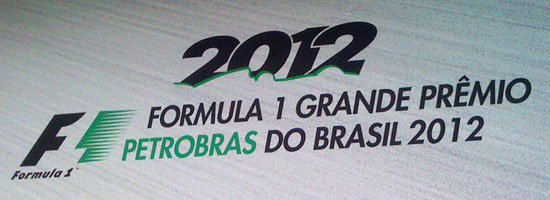 Formula 1 2012 São Paulo - Brazil Grand Prix for EBU, Special report
Formula 1 2012 São Paulo - Brazil Grand Prix for EBU, Special report
The Dutch satellite uplink company Multi-Link Holland is responsible for all Formula 1 EBU (European Broadcasting Union) transmissions.. This company travels the world since 2004 for the Formula 1. You can regonice them easily by their green uplink dishes. Since 2004 they produce satellite uplinks at the Formula 1 for many broadcasters, RTL Netherlands, RTL+ Germany, ORF Austria, Sky Italia, Ferrari TV, ViaSat Sweden and more. They will give us an inside look through the whole season in what they must achieve on every location they land with their equipment, starting this weekend in Melbourne Australia and ending 25 november in Brazil. At this last race in Brazil we will do a special report about this company on the Interlagos circuit
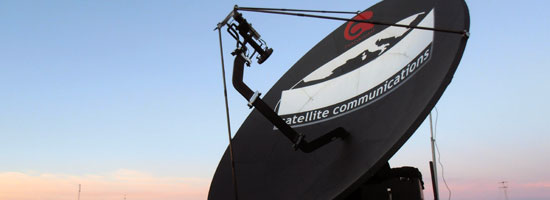
One year almost, one season Formula 1 and traveling the whole globe for the Multi-Link Holland Uplink team. That means we have some statistics for you in this last Formula 1 article of this year.
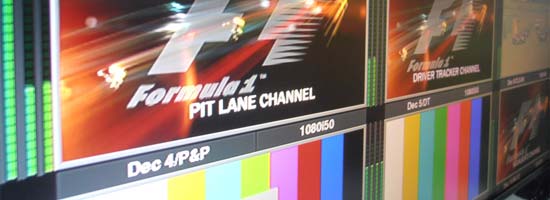
Gerben Vissers "Past season was a very long season. Every race we were on the spot with a least four people of Multi-Link Holland. it means we did travel, work, drink, eat, sit, run solve , talk, joke and laugh a lot. The thing we did most i will put it into some statistics".
Team Statistics:
• 34 Plane flights for each team member
• 40 Train travels for each team member
• Thousands of kilometers truck drives thru Europe
• 75 Rental cars (in which all are brought back in a... working condition)
• 134 Different Hotels
• 140 Hotels Breakfasts
• 8378,4 Jokes and laughs
• 1440 hours of work (at least) on location for each team member
• 181 Visits to different restaurants, snackbar's, grill houses
• 750 Hours of transmitting for each dish and HPA
• 321,5 Hamburgers (but we think it is more than that even)
.................... and about 20.160 Can's of cold Coca Cola Light (Diet Coke)
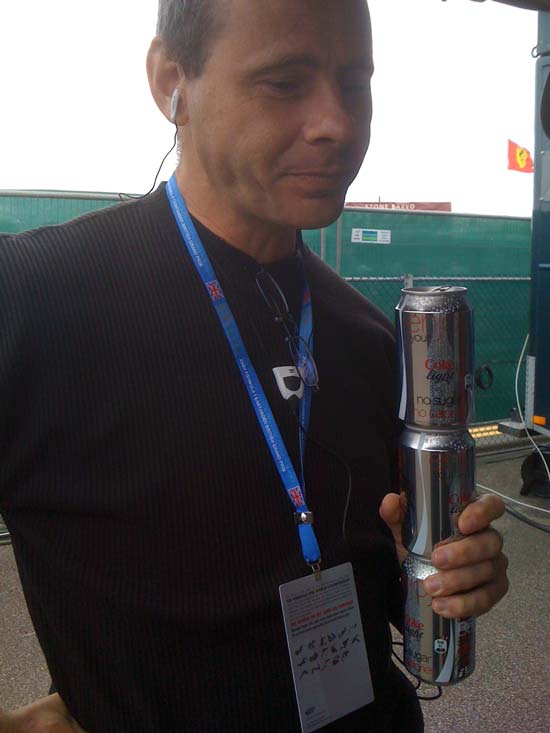
"It was a very nice season. Everything has gone very well this year. Also it was very challenging because in addition to the connections for the EBU we also produced the video / audio production for TV Globo Brazil and the editset + uplink for the German Broadcaster ZDF We are most of the time far from home and work long hours. But it's a nice group of people we work with and we visit very special locations. Besides we have to entertain ourselfs on the job to keep the team spirit" Gerben explained.
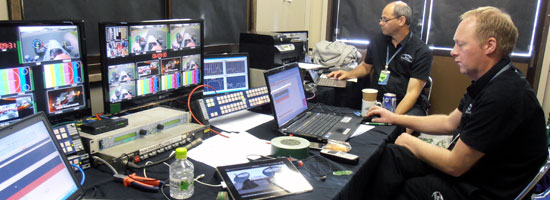
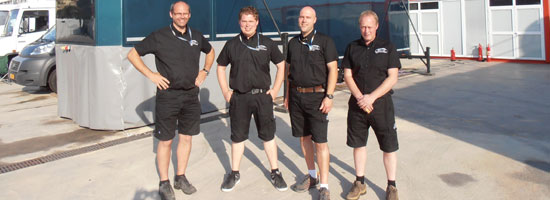
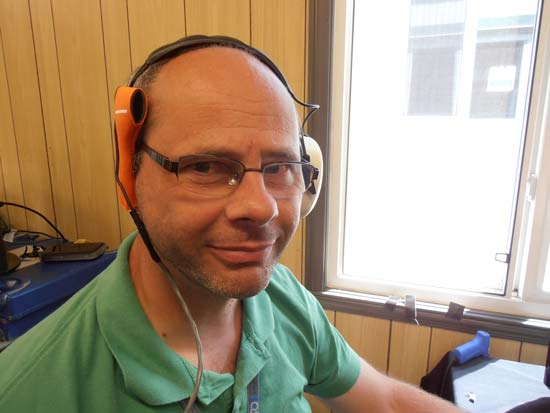
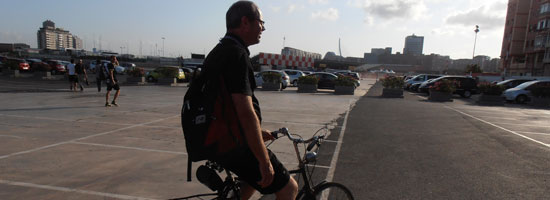
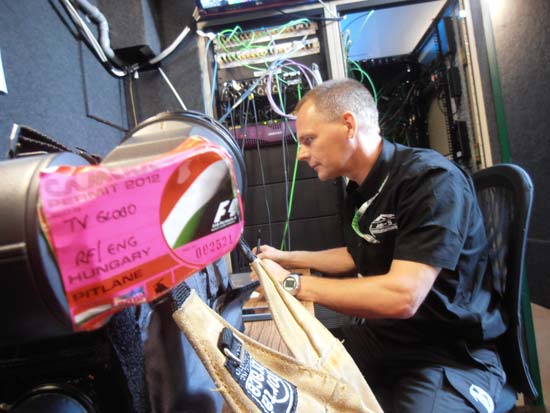
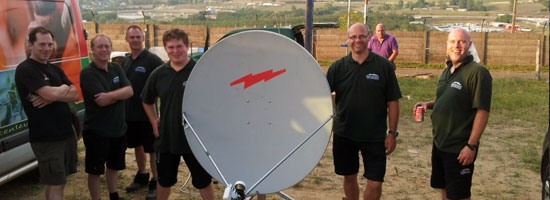
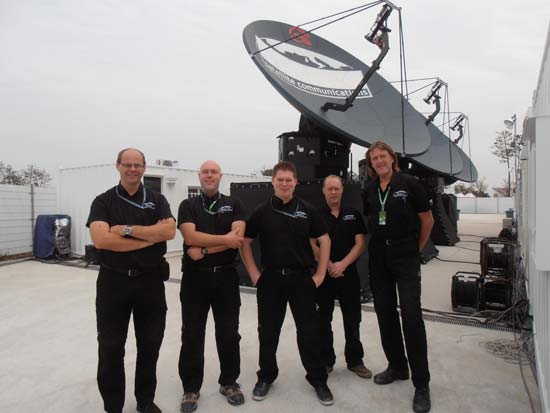
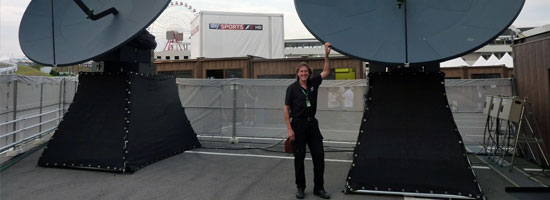
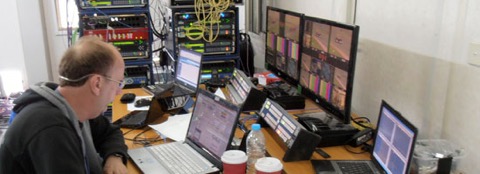
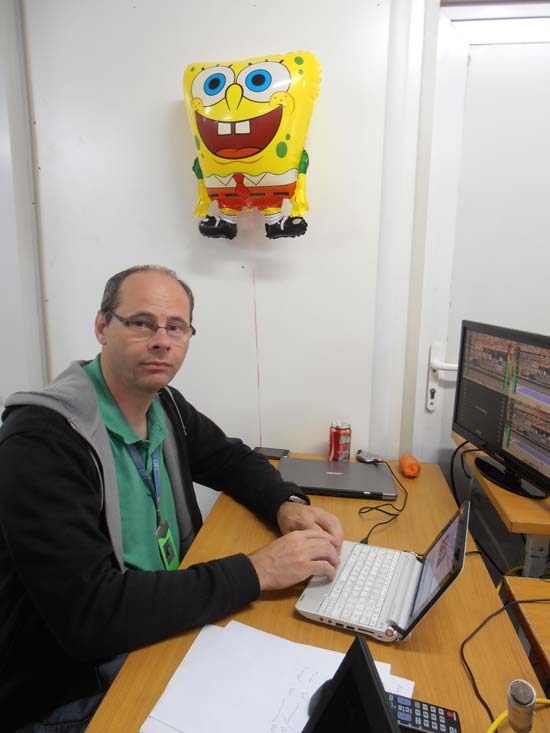
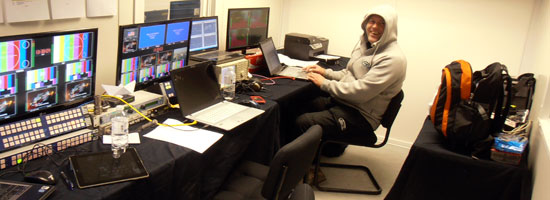
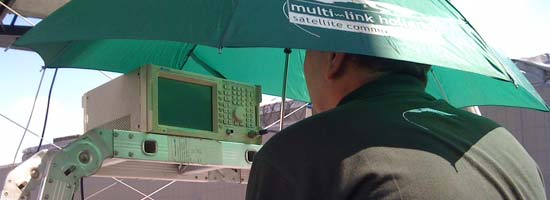
Gerben"I would like to say thanks to anyone I have worked together over the past year. Such as my colleagues of Multi-Link Holland, the staff of SKY, the employees of the EBU, the employees of the FOM, the staff of TV Globo Brazil , the guys from D.O.T. and many, many others. I also want the readers and creators of this blog thank you for the interest. I hope to see everyone back next season".
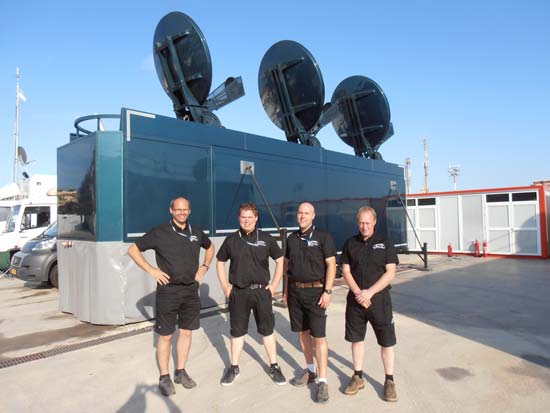
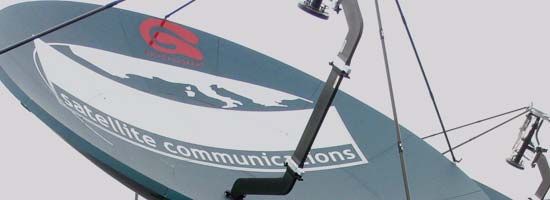
This was the last Formula 1 blog entry for this year, we hope we will do this next year again with the guys from this Dutch company. We can learn from them a lot, to se what they do to acchieve the result at the end of the season. We can also see that the english language is the basic used language on this event, so of you want to work there, start to study your english. Thanks Gerben Vissers, Bob Snieder, Marco Mohr , René van Hooff and Marco van Uffelen for their support on this blog last years. Hope to see you all next season for some nice tech stories again. Happy Holidays guys !!!
Listen every friday night Live to Grand Prix radio stream by Olav Mol .
Every Grand Prix a new Mix on, this time a Brazil Special at 19:00 tonight !!!!!!!
More photo's available on our Broadcast Brazil Facebook page, you can find them here.
mentioned:
Multi-Link Holland
EBU
Sky Sports
Globo TV Brazil
D.O.T.
Gigasat
Coco Cola Light
Olav Mol
Grand Prix Radio
Special report: WIF & NIF, day 4
 Formula 1 2012 São Paulo - Brazil Grand Prix for EBU, Special report
Formula 1 2012 São Paulo - Brazil Grand Prix for EBU, Special report
The Dutch satellite uplink company Multi-Link Holland is responsible for all Formula 1 EBU (European Broadcasting Union) transmissions.. This company travels the world since 2004 for the Formula 1. You can regonice them easily by their green uplink dishes. Since 2004 they produce satellite uplinks at the Formula 1 for many broadcasters, RTL Netherlands, RTL+ Germany, ORF Austria, Sky Italia, Ferrari TV, ViaSat Sweden and more. They will give us an inside look through the whole season in what they must achieve on every location they land with their equipment, starting this weekend in Melbourne Australia and ending 25 november in Brazil. At this last race in Brazil we will do a special report about this company on the Interlagos circuit
Friday is always a long day for us. It starts at 8:00 in the morning with the first transmission. We arranged satellite capacity from 7:45 so we ensure that we are present at 6:45. This means we must leave very early from our hotel to prevent we are late. At 10:00 the first free practice.

We allow you to send to the WIF (Wide international feed), NIF (Narrow international feed) and Sky UK. Everything in HD1080i50. The difference between the WIF and NIF is that the graphics in the NIF fall within a 4:3 frame so that even the edges off him in 4:3 can be broadcast. This because in some countries they still transmit in 4 by 3... and also need to see the Graphics, timing info, standings etc etc
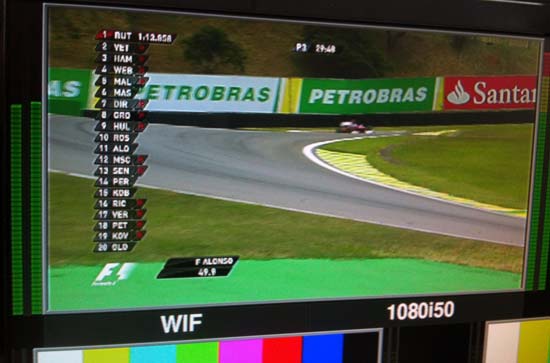
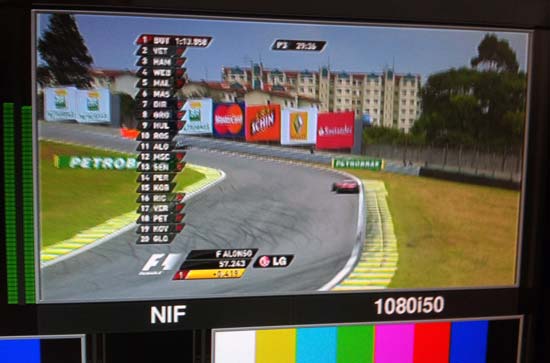
In addition to these channels, we ensure also that 2 muxed signals go by fiber to Europe. These both are put on satellite in Germany by another uplink.
In the afternoon we transmit the second free practice. We also do the tape feeds for different broadcasters at the Play Out Desk. In this configuration we WIF a 2 channel muxed mpeg 4 so we simultaneously help more customers ate the same time. We got a lot of happy clients this way.
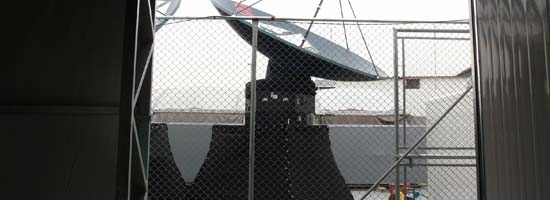
At 20:00 we are finished and it is than time to cool down our HPA's and search a good restaurant in which is easy in São paulo. On Saturday morning the alarm wakes us up again at 6:15.... saturday is 1 free practice and qualifying... loooong day again.
Listen Tonight Live to Grand Prix radio stream by Olav Mol with a Brazil Special at 19:00 Brazil time.
Every Grand Prix a new Mix on, this time a Brazil Special at 19:00 tonight !!!!!!!
More photo's available on our Broadcast Brazil Facebook page, you can find them here.
mentioned:
Multi-Link Holland
Sky Sports
WIF
NIF
Olav Mol
Grand Prix Radio
Special report: Tweeking setup, day 3
 Formula 1 2012 São Paulo - Brazil Grand Prix for EBU, Special report
Formula 1 2012 São Paulo - Brazil Grand Prix for EBU, Special report
The Dutch satellite uplink company Multi-Link Holland is responsible for all Formula 1 EBU (European Broadcasting Union) transmissions. This company travels the world since 2004 for the Formula 1. You can regonice them easily by their green uplink dishes. Since 2004 they produce satellite uplinks at the Formula 1 for many broadcasters, RTL Netherlands, RTL+ Germany, ORF Austria, Sky Italia, Ferrari TV, ViaSat Sweden and more. They will give us an inside look through the whole season in what they must achieve on every location they land with their equipment, starting this weekend in Melbourne Australia and ending 25 november in Brazil. At this last race in Brazil we will do a special report about this company on the Interlagos circuit.
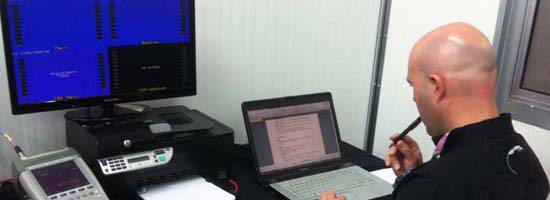
Thursday is always the day of the fine-tuning and tweaking, testing systems and the doing first Uplinks for EBU.
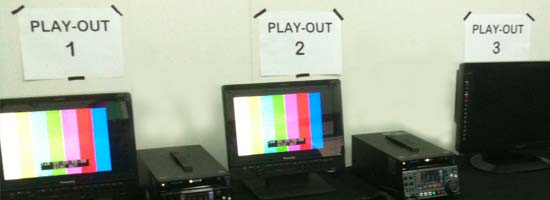
In Brazil we do besides the uplinks for EBU also the so called Play Outs. In the same cabin where we do the uplinks are also the play-out machines connected. The broadcasters that only have a camera ENG crew on location, enter our cabin with their footage to send it to their homeland. Normally this will be covered by the host broadcaster and we only transmit the signals but in Brazil we also coordinate all these Play Outs. We use 2x a HD XDCam deck and 1x P2 HD player. Customers with other formats run their own player or camera and give us the HD-SDI output. We put this signal this through fibers to our HD-SDI router and switch it to the correct encoders in our rack.
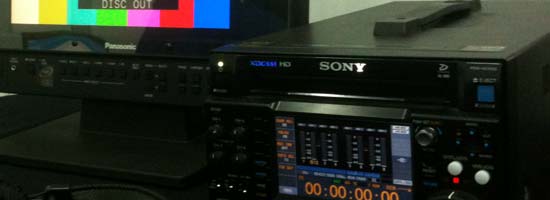
On Thursday we also test the uplinks. Almost every race in every country we have being we do this on Thursday 14:00 local time, a full test. Here do almost all broadcasters participate. It is a live as race test (like it would be on sunday) in which all systems tested. The tests went smoothly today.
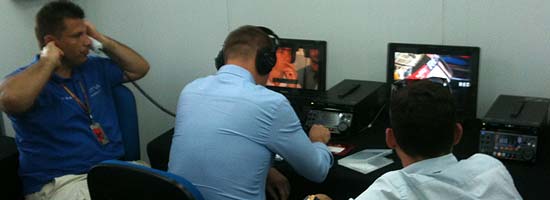
Other broadcasters had some problems in the morning problems because something went wrong with the local voltage. We were happy here not bother because we work with an automatic switch where both local voltage and a generator. Behind this is a 80kVA UPS. This system, we only use in Brazil and in recent years also proved very necessary, every year there are problems in this. Last year the man in control of the power decided to stop the generators just after the race. The man thought the race is over so I can shut down and go home. He really did not realize that the pre and so called 'aftershows' often are the major programs related to advertising revenue.
Friday first Free Practice Transmissions, we are ready for it.
Every Grand Prix a new Mix on, this time a Brazil Special:
More photo's available on our Broadcast Brazil Facebook page, you can find them here.
mentioned:
Multi-Link Holland
Sony professional XDCAM
EBU
Sky Sports
Special report: Finalizing EBU setup, day 2
 Formula 1 2012 São Paulo - Brazil Grand Prix for EBU, Special report
Formula 1 2012 São Paulo - Brazil Grand Prix for EBU, Special report
The Dutch satellite uplink company Multi-Link Holland is responsible for all Formula 1 EBU (European Broadcasting Union) transmissions. This company travels the world since 2004 for the Formula 1. You can regonice them easily by their green uplink dishes. Since 2004 they produce satellite uplinks at the Formula 1 for many broadcasters, RTL Netherlands, RTL+ Germany, ORF Austria, Sky Italia, Ferrari TV, ViaSat Sweden and more. They will give us an inside look through the whole season in what they must achieve on every location they land with their equipment, starting this weekend in Melbourne Australia and ending 25 november in Brazil. At this last race in Brazil we will do a special report about this company on the Interlagos circuit.
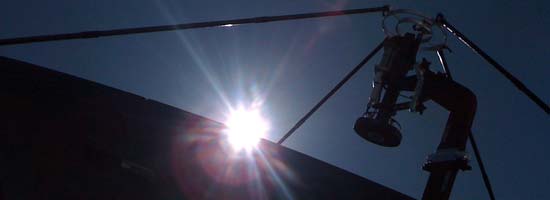
Again a very very nice sunny day in São Paulo. This makes working more easy and more pleasant. It is still needed to prepare the 3 Gigasat dishes for Rain. Knowing from past years the weather can change suddenly over here. Protection against water of the Amplifiers is very important, they do not like it too much.
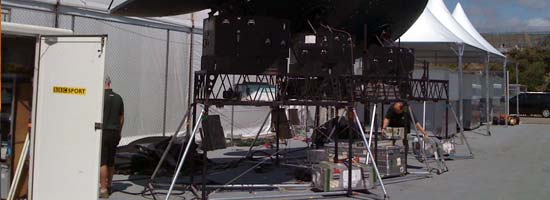
Meanwhile still waiting for the promised tables so the Play Out's can be installed. They will be there at 11:00 ... they said. Then concentrate first on the other cabling towards FOM and TV Globo Brazil. FOM needs cables for audio, communications and WIF + NIF signals what need to be transmitted. These last 2 go by a fibre. Globo just needs WIF + NIF, these go by copper.
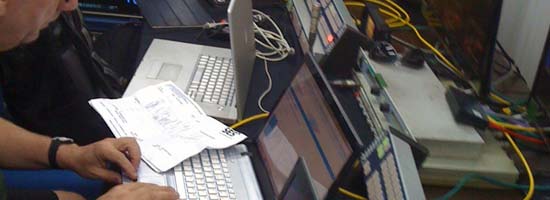
Also the work on the dishes themselves continues. They are pointed precisely to the satellites, and there will be some testing with all 3. Following the instructions and info delivered by EBU and the satellite operator are crucial. Communications between them is only in the english language, does not matter where the satellites are from Japan, Brazil or Germany.

At 15:00 the so hard needed tables arrived, or better said....... EBU bought those themselfves at a shop in São Paulo. No time to waste! The Play Out's , XDCAM HD were installed rapidly and professionaly by a Brazilian rental company. All signals from the Play Out's go by fibre to the Rack where they will be encoded and transmitted.
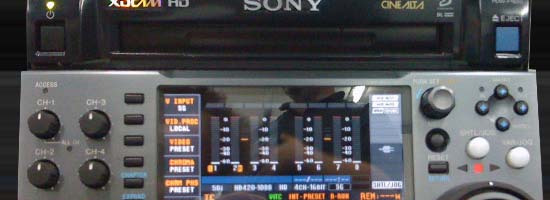
All setup now, just some minor things to arrange on thursday. The last parts of the work on the dishes is done, the finalization with the black fabric around the frame underneath the dishes are performed, just to let make everything looking great and protect some more against rain water. This fabric solution is invented by Multi-Link Holland themselves.
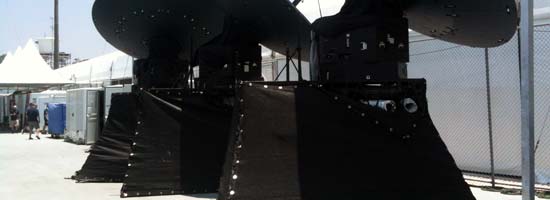
At 22:00 all was done for today. Time for some food (did not have lunch even yet).
Every Grand Prix a new Mix on, this time a Brazil Special:
More photo's available on our Broadcast Brazil Facebook page, you can find them here.
mentioned:
Multi-Link Holland
EBU
Sky Sports
Globo TV Brazil
Gigasat
D.O.T.
FOM (Formula 1 management)
Special report: Setting Up Dishes, day 1
 Formula 1 2012 São Paulo - Brazil Grand Prix for EBU, Special report
Formula 1 2012 São Paulo - Brazil Grand Prix for EBU, Special report
The Dutch satellite uplink company Multi-Link Holland is responsible for all Formula 1 EBU (European Broadcasting Union) transmissions.. This company travels the world since 2004 for the Formula 1. You can regonice them easily by their green uplink dishes. Since 2004 they produce satellite uplinks at the Formula 1 for many broadcasters, RTL Netherlands, RTL+ Germany, ORF Austria, Sky Italia, Ferrari TV, ViaSat Sweden and more. They will give us an inside look through the whole season in what they must achieve on every location they land with their equipment, starting this weekend in Melbourne Australia and ending 25 november in Brazil. At this last race in Brazil we will do a special report about this company on the Interlagos circuit.
We arrived last tuesday at lunchtime in the impressive circuit at Interlagos, São Paulo. Here we meetup with the crew of Multi-Link Holland to follow them next coming days in transmitting this Grand Prix Live for the whole world from Brazil.
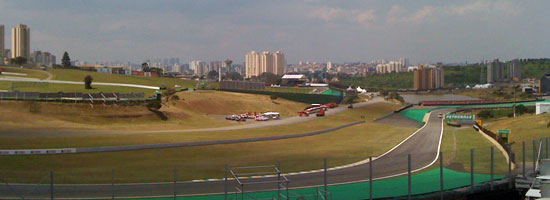
On the São Paulo TV-Compound Multi-Link Holland is situated in a nice box. The rack's with equipment already arrived, ready for building up and connecting the needed cables. In the same box also the 'play-outs' will be made for the diverse ENG teams. Problem number 1, there are not tables enough to give everything a place. Instead we start with building the racks, monitors and routing. Those tables will hopefully arrive tomorrow.
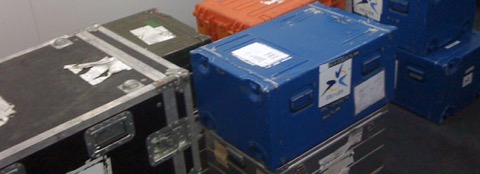
Another problem.... the satellite dishes are still not declared by the Brazilian customs yet. Because it is equipment to transmit they have to check them twice. The D.O.T. expect them to arrive at night from the Airport of Campinas. So..... let's than do also some cabling already to some other boxes and the place where the dishes will be placed. Problem 3, the guy with the drill seams to be very busy... we have to wait for that. Meanwhile we are finalizing the racks and cabling for it. Besides that.... the coffee machine is installed.
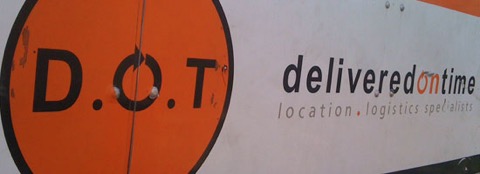
At about 19:00 we receive the message that the drill is broken, it seams there is only one on the circuit... so that will be tomorrow before they come back with a new one. We almost left the TV-Compound when the D.O.T. informed us that the dishes arrived. We stayed to build them up. Setting up these dishes is a very precise job. Step by step they are place and pointed in the right direction. It is obvious these guys are very experienced in this, take a look at the following photo's
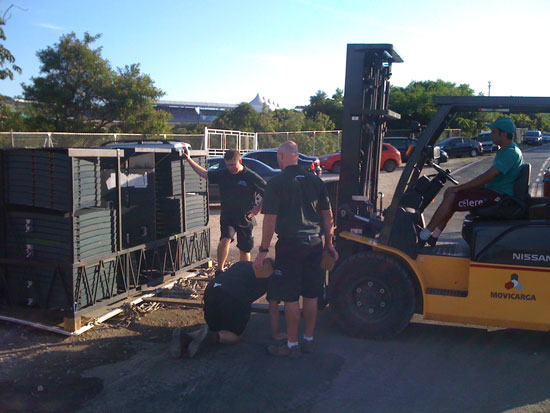
Unpacking the 3 x Gigasat FA370 dishes that will be used for the EBU transmissions in Brazil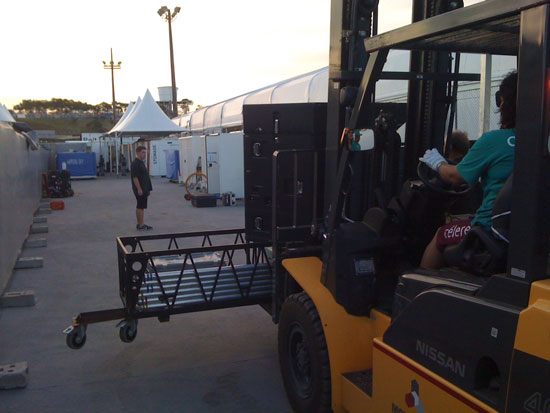
Getting the 3 x Gigasat FA370 dishes on their spot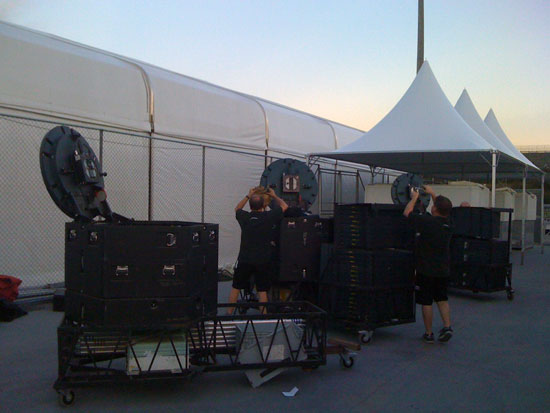
Step 1: Prepare cabling and put needed equipment on it's place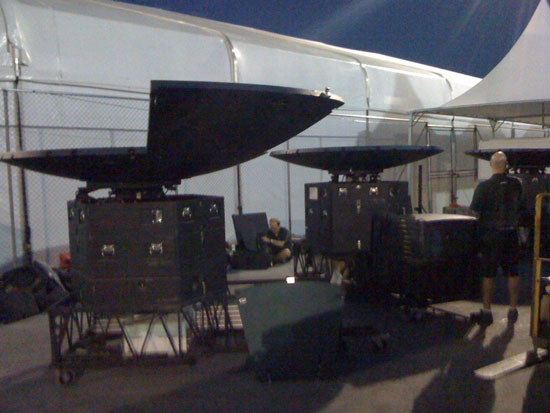
Step 2: Parts of teh dishes are installed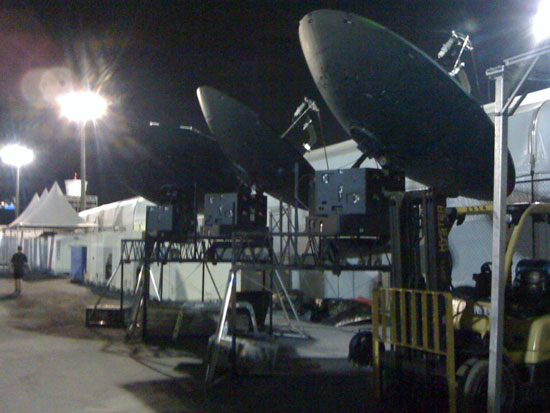
Step 3: Heads on, and dishes installed on their frame and height.
At 23:00 all was setup, it is called a day by the crew. Wednesday will be cabling and pointing the dishes to the satellites.
Every Grand Prix a new Mix on:
More photo's available on our Broadcast Brazil Facebook page, you can find them here.
mentioned:
Multi-Link Holland
EBU
Sky Sports
Globo TV Brazil
Gigasat
D.O.T.
The Motion Graphics production in Brazil. The past and the future.
The Motion Graphics production in Brazil. The past and the future.
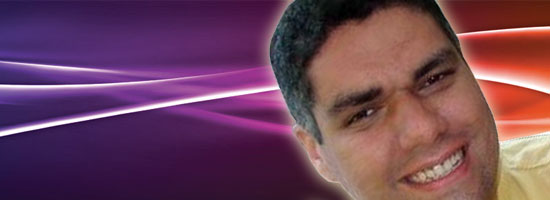
Daniel Guimaraes is graphics designer for TV stations in the Brazilian market since 2004
The graphics have always been huge part of audiovisual production in Brazil. Since the beginning of TV Tupi in 1950, where the cartoon of a friendly little Indian boy called programmes until today with computer graphics leaving viewers more awestruck than ever.
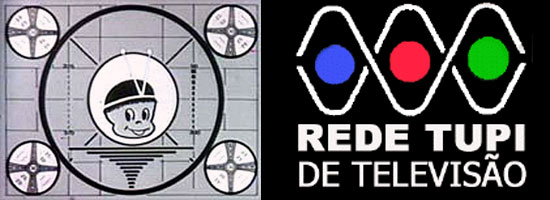
TV Tupi
The Brazilians have a special fascination with regard to the "graphic identities" of video productions. Much is due to the Austrian designer Hans Donner, known nationally and internationally as the "Wizard of Graphics". Donner, art director of the giant TV Globo has revolutionized the world of graphics on TV in the late '70s and early '80s, with its unique style and 3D animation. A revolution for the time.
If asked, Brazilians remember every single intro sequence of their famous telenovelas (soap operas). Among the audience, the motion graphics are still a very big success.
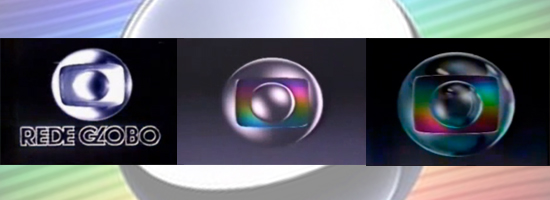
TV Globo Brazil
Nowadays with the advent of digital media, internet, cable channels (cable TV only began in Brazil in the late '80s), this market is experiencing a very large expansion. At the same time, trends change. The geometric shapes of metal flying in space - Donner's mark in his job for TV Globo in 80s - were outdated. Today, Brazilian TV graphics are getting more and more similar to those produced internationally.
Over the past 10 years audiovisual production in Brazil is seeking to fit within the international standard. A movement that follows the evolution of the country - increasingly inserted in the international market
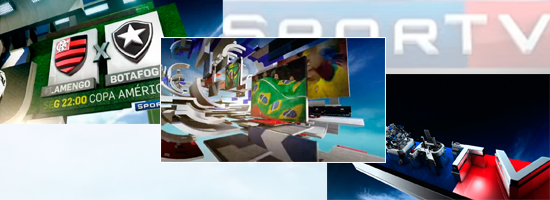
SporTV
Channels like SporTV (pay-TV) and TV Alterosa (affiliate of SBT network in Minas Gerais) sought in major international animation graphics companies solutions to their demands, in their very case the companies are US-based Troika and Renderon, respectivelly.
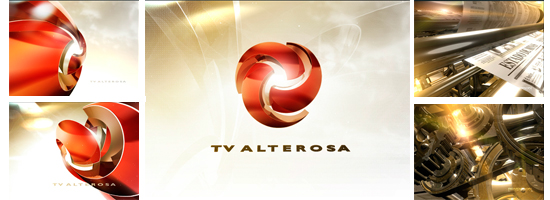
TV Alterosa
Rio de Janeiro-based animation producer Beeld is perhaps the example that Brazilians have understood this market movement. Beeld produces excellent pieces for various cable channels and also gives a more current and fresh style to Globo, indeed in their famous soap operas opening sequences.
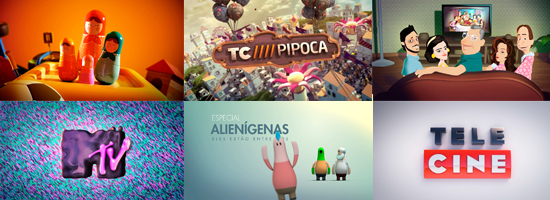
Beeld - Rio de Janeiro
Globo continues to spearhead this in Brazil, but the myriad of channels that are available today in the Brazilian television, along with the internet/webcast booming marketing opens up great opportunities.
The federal law 12.485 from 2011 is now requiring cable channels to have part of their programming produced in Brazil, This is already creating demands for this market even more, especially for freelancers willing to make its mark in the market of the South American giant. And with the World Cup 2014 and the Olympics 2016 on the horizon, this demand grows further, it is up to designers worldwide know how to discover Brazil animations and computer graphics market.
VFX playlist:
Video playlist with TV Tupi , Globo , Troika, Renderon & Beeld
Daniel Guimaraes is graphics designer for TV stations in the Brazilian market since 2004.
mentioned:
TV Tupi
Hans Donner
Telenovelas
SporTV
TV Alterosa
Troika
Renderon
Beeld
UFC 147 in Belo Horizonte.
The 21st till 24th of june Broadcast Brazil was in Belo Horizonte in the state of Minas Gerais, Brazil, at the 147th UFC event.
This big fighting event was held in the stadium Mineirinho.
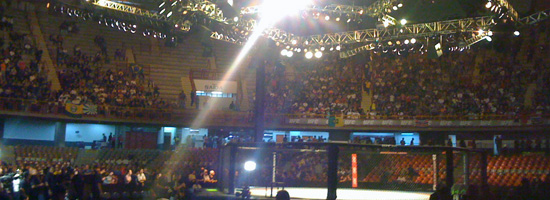
Mineirinho, Belo Horizonte - one hour before the live broadcast starts.
A well known figure at this event is Brian Froustet, a very experienced A2 (Senior audio assistant)
We had the chance to ask him a couple of questions about his work at the UFC events.
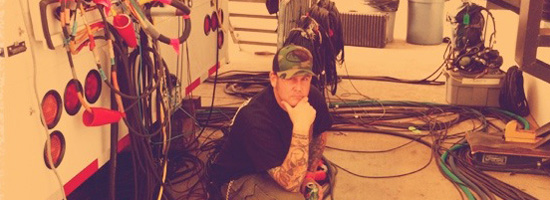
Brian Froustet, A2.
BB: So Brian, please tell us what is your function, and what does it include
Brian: "I’m an A2 or Audio assist. Basically I take care of everything not dealing with the actual mixing of audio of the show. My main position with UFC is the Booth A2 which entails setting up the Booth Announce position for Mike Goldberg and Joe Rogan for them to announce the fights and do there on camera stand ups. I also set up all the comms, courtesy listen headsets and put the efx around and under the Octagon. But as you know my job is not limited to that. As an audio team we all jump in to take care of whatever needs to be done audio wise for the show whether it be running or making cables, building other interview positions and just helping each other out however we can".
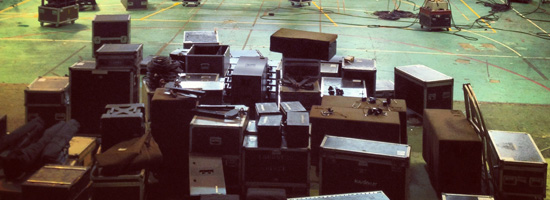
Mineirinho, Belo Horizonte - setting up.
BB: How many years are you working on the UFC
Brian: "I have been working with the UFC since 2008"
BB: What is for you the best part of the UFC events
Brian: "There are many great things about working all the UFC events... Besides traveling all over the states for shows I have been lucky enough to have also gone to Australia, Japan and Brazil for events. I have also been lucky to meet some pretty amazing people because of traveling all over. But I think the best part for me is being able to do all that with the audio guys I travel with, MJ Law, Ryan Mitchel and Robert Massey. I couldn't imagine doing this job without them, they are the best at what they do and are the best friends a guy could ask for. Oh, and I get to see some pretty amazing fights, hahaha".
BB: What is the difference Brazil and other countries at UFC events
Brian: "I think the biggest difference between doing UFC events in Brazil and in other countries is definitely the language barrier. It seems that most of the other places we go English is used quite a bit more than it is in Brazil. Obviously we all try and learn some basic Portuguese to communicate, but as I'm sure you know its not an easy language to learn.
As for the equipment and venues, there is really no difference with some of the places we work in the States. Some buildings are easy to get stuff in while others are just a big pain in the ass".
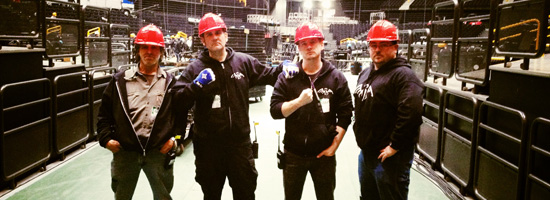
Your DreamTeam for any UFC event.
BB: What are the good and bad parts of Brazil as event host
Brian: "Brazil is an amazing place to hold UFC events. The energy of the crowd is like no other place I have been with them. Its awesome to hear and see people screaming and cheering for six hours straight. I really can't think of anything bad other than its tough for me to eat at times since I don't eat meat...The Brazilians really love their meat".
BB: Does the latin culture influence the way of working
Brian: "The culture itself doesn't really influence our way of working as I am sure you guys can tell. We obviously like to have fun but when its time to work we get the job done. We do whatever we can to respect the ways of the people or country we are in".
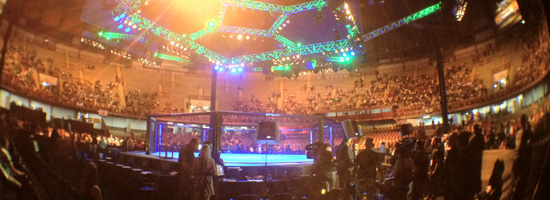
Mineirinho, Belo Horizonte - one hour before the live broadcast starts.
BB: Any specific technical difficulties this last UFC, and if so, these were due to what
Brian: "The only real technical difficulty we had for this past UFC in Belo Horizonte was one that, as small as it may be, caused quite a few issues and that was power for all the equipment. It wasn't the power itself but actually the plugs on the power cords. It was all 220v, but all of our equipment was Australian power and the power strips we had were Brazilian. Once that issue was solved we were good to go".
BB:Do you see a rise in the amount of (english speaking) Brazilian Broadcast Technicians needed during the UFC in Brazil. And in which specific areas.
Brian: "I do. I know there are plans to do more UFC events in Brazil and also with the World Cup And Olympics coming to Brazil, I think it would be a huge help. I'm not saying that the people coming to Brazil shouldn't learn some Portuguese, but even with that the translation does not always covey the way you would like. That being said I also don't want to take work from the locals but the reason they bring all of us is the ease of communication and we know the show and what needs to be done.
Now Obviously we have had the pleasure of having Niek van Esch, René Schaap and Danny Littlwin on the shows which is a huge help so Audio is not really an issue.
The biggest issue usually seems to be with the Camera operators. They don't send them all from the States and we do use locals. At times we have to set up a translator in the truck to tell them what the Director wants. Most of them speak some English but like I said before, what the Director say/wants and how they, the camera operators, understand, that is not always the same".
BB: Any good advice for the Brazilians in this area
Brian: "I would say to just ask questions. I know when I see new equipment or someone doing things differently than I would, I need to know about it. We all are always willing to show someone something new, it is how we all learned and how we are still learning.
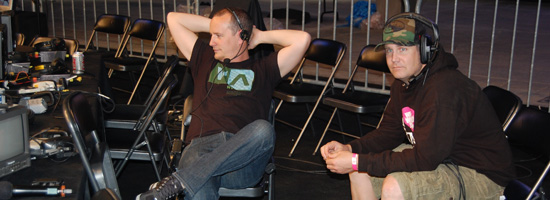
All under control.
So we hope this is, besides, fun to read, also a good help and insight information about foreign broadcast events held in Brazil and what the future may hold".
More photo's available on our Broadcast Brazil Facebook page, you can find them here. Like us if you want ;)
And see our former blogpost about the UFC event held in Rio de Janeiro.
mentioned:
UFC
Danny Littwin
UFC - Rio de Janeiro
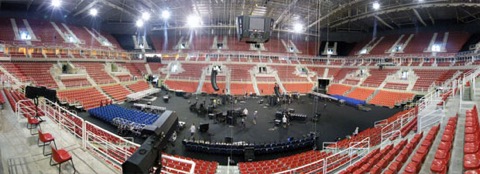
Brasil
After the huge success of the last UFC event in Rio de Janeiro on August 2011, the organization decided to have another UFC event in Rio, few months after the first edition. UFC is BIG in Brazil! Several local and foreign broadcast companies were on location to transmit live.The main TV Broadcasts were hosted by Alfacam Brasil, and two of their OB vans. Alfacam is a big international video-facility company, based in Belgium. They opened their Brazil office last year at the PoloRio Cine&Video in Rio de Janeiro, and are ready for the market in Brazil, and of course their goal, to host the FIFA World-cup 2014 & Olympic games 2016 in Brazil. Alfacam is a company with the capabilities and equipment for these international events, and provided the World-cup soccer & Olympic-games already before with OB-vans and classified people.
But also companies from Brazil are in Rio with their equipment and people, like Brasil Rig, Gabisom, Globo & GloboSat. Both Globosat & Globo brought their own OB-vans. Casablanca Online is delivering all satellite uplink facilities for live but also play-outs , and had 8 uplink trucks on site, to deliver the uplinks for the TV stations.
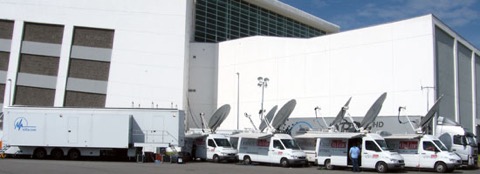
Foreign
One of the most important parts of this production is communications. Not only intercom between technicians cameramen, etcetera, but also the language. The main spoken language is english. For audio visual professionals to work in an international production like the UFC event, they need to be able to communicate, both in word and writing, English.
Nevertheless, walking on the production floor you also hear Flemish, Dutch & Portuguese. There is a mix of Europeans, Americans and Brazilians working together to produce the UFC event, apart from a few language problems here and there, this goes well because of the basic knowledge of english among the crew. It must be stressed however that it will be a challenge in the future of broadcasting in Brazil.
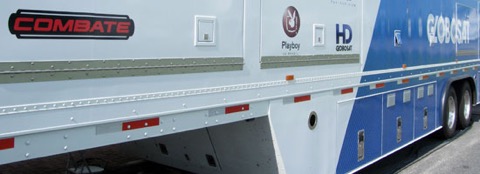
Event
The show went technically very well, but also the fighters from Brazil did their thing... they won a lot. We can expect the UFC back this year for sure in Rio de Janeiro or another city. These are important times for Broadcasting aligned companies in Brazil. With the 2 big events, the FIFA World-cup 2014 & Olympic games 2016 on our doorstep this UFC event shows that Brazil is technically ready for delivering top quality productions. If all personnel starts speaking and understanding better english there will be a wide market of jobs available for the local people.
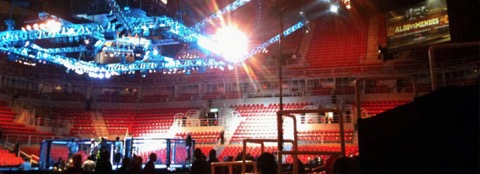
mentioned:
UFC
Alfacam Brasil
Casablanca Online
SporTV GloboSAT
Globo TV


